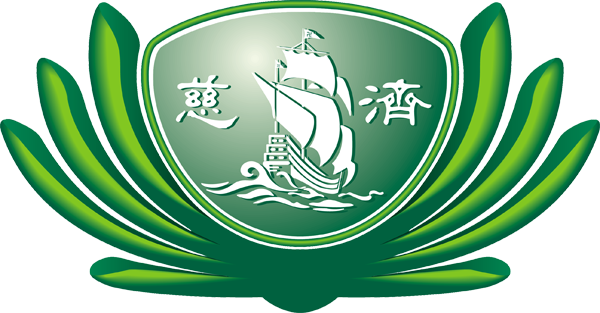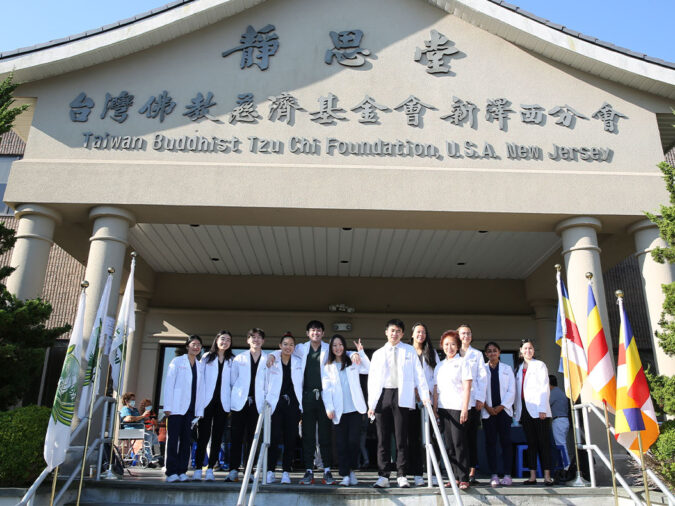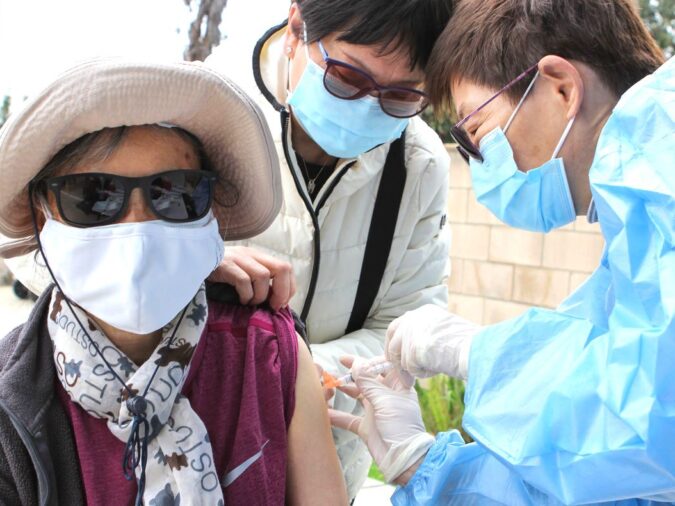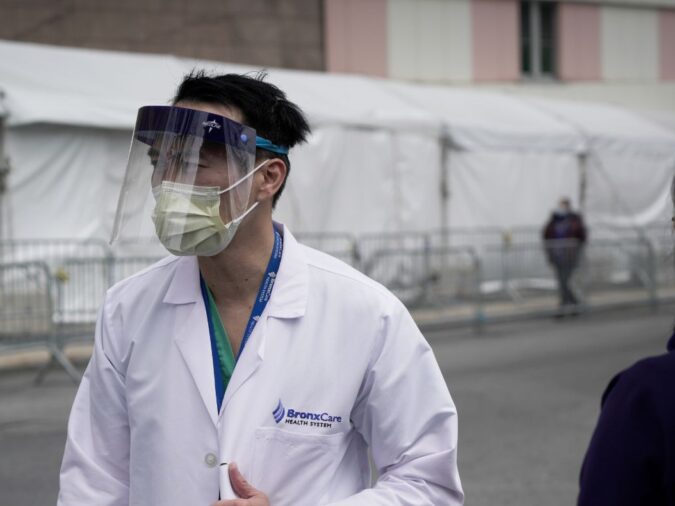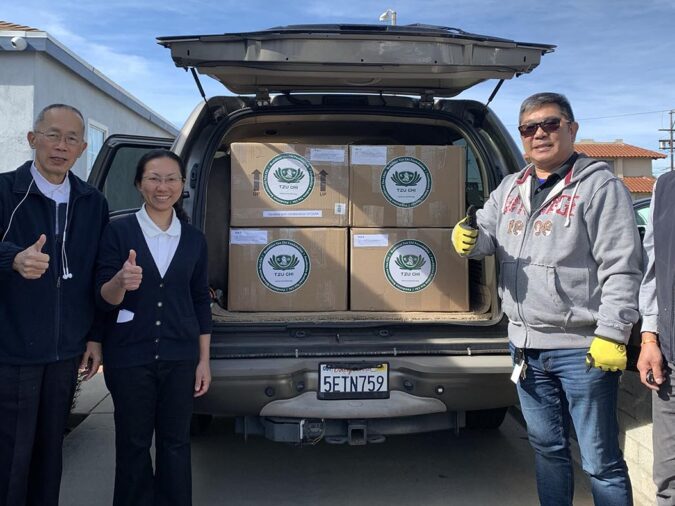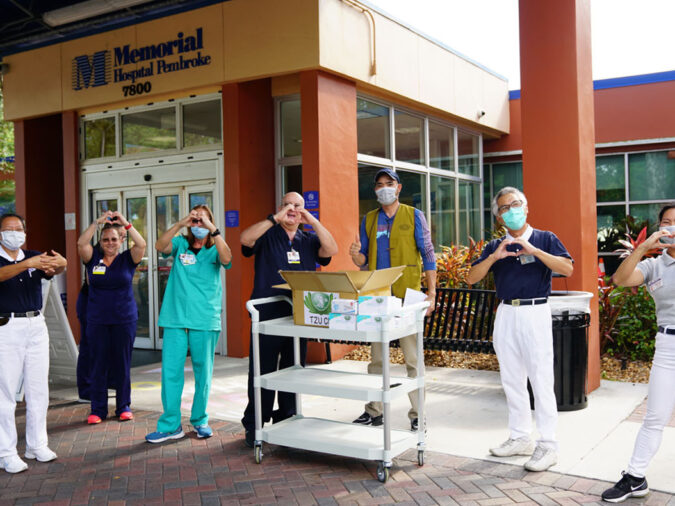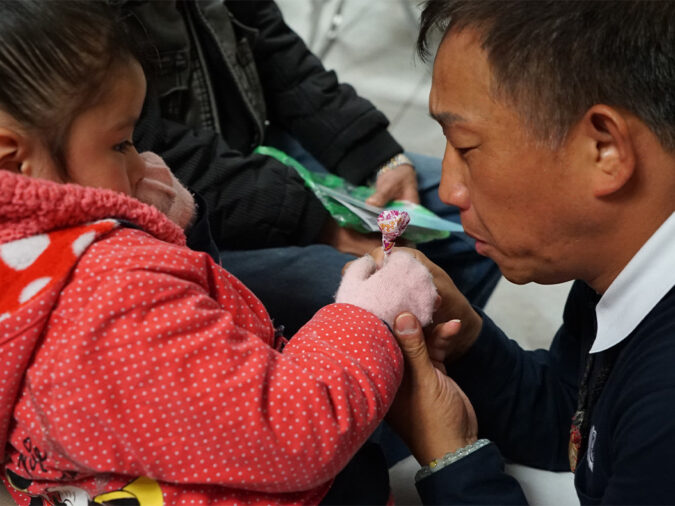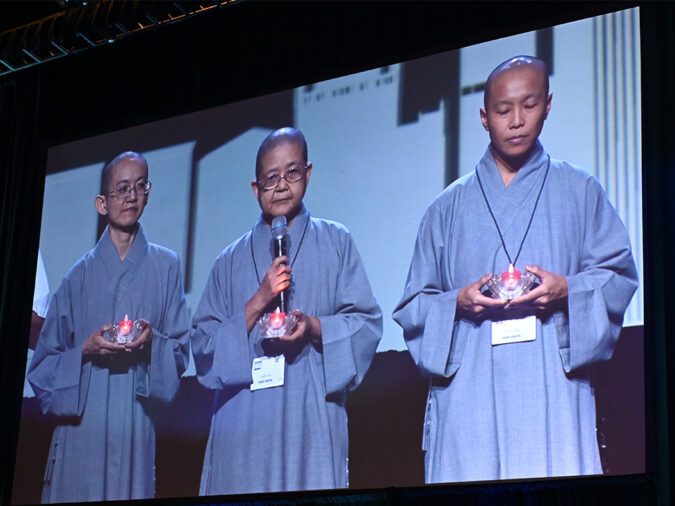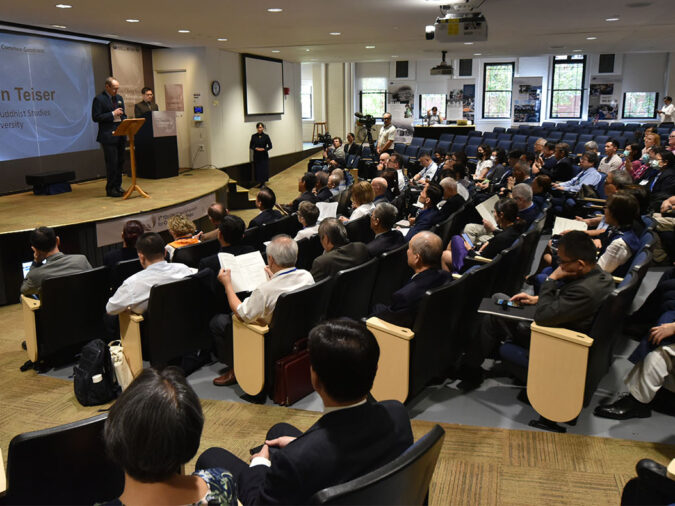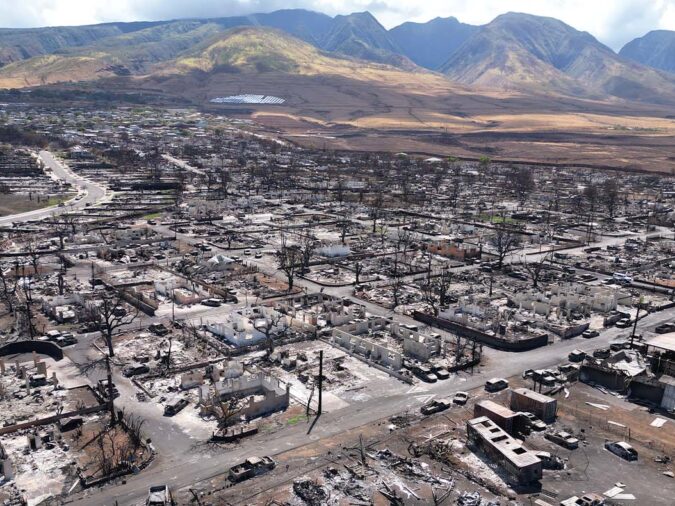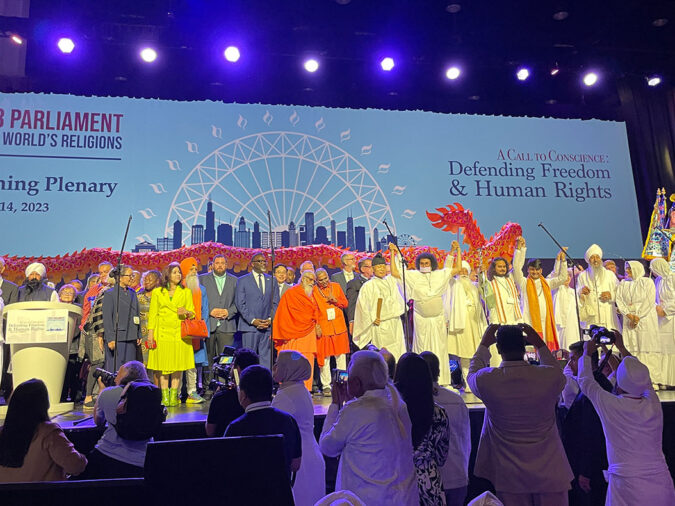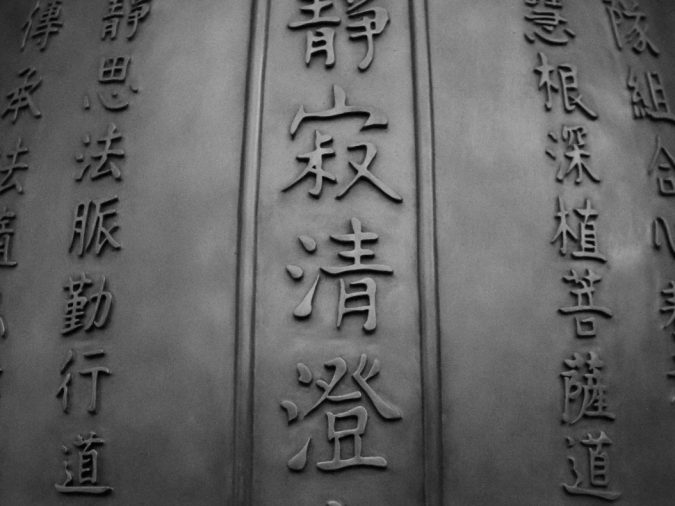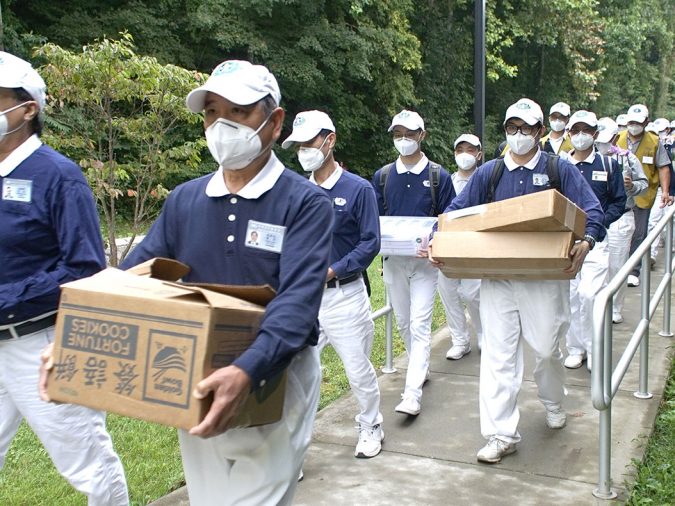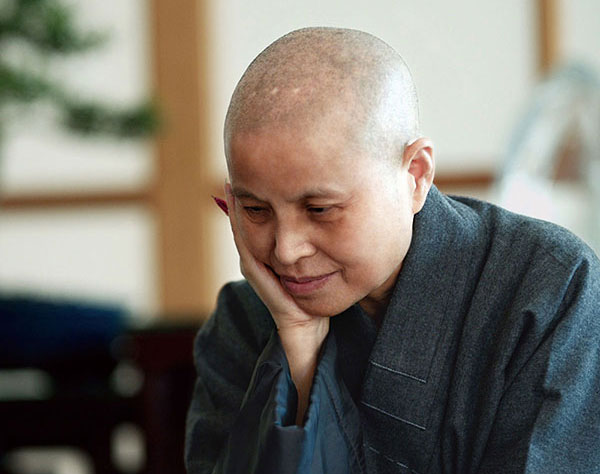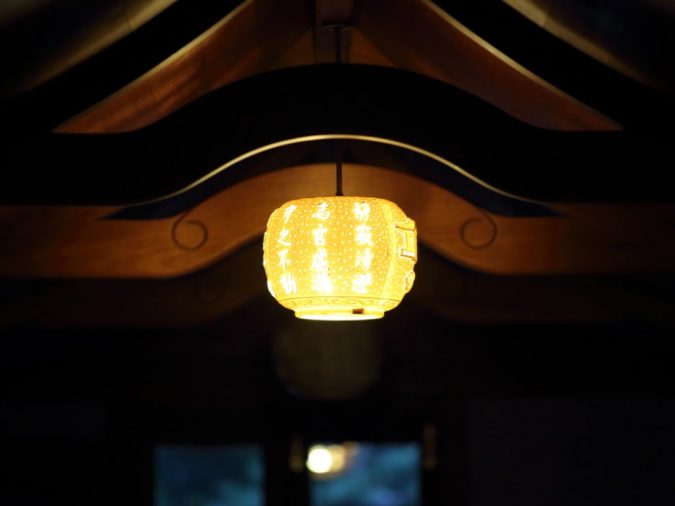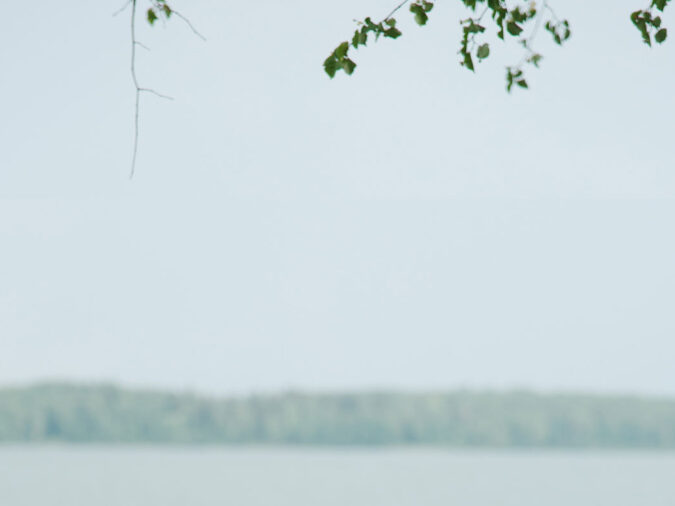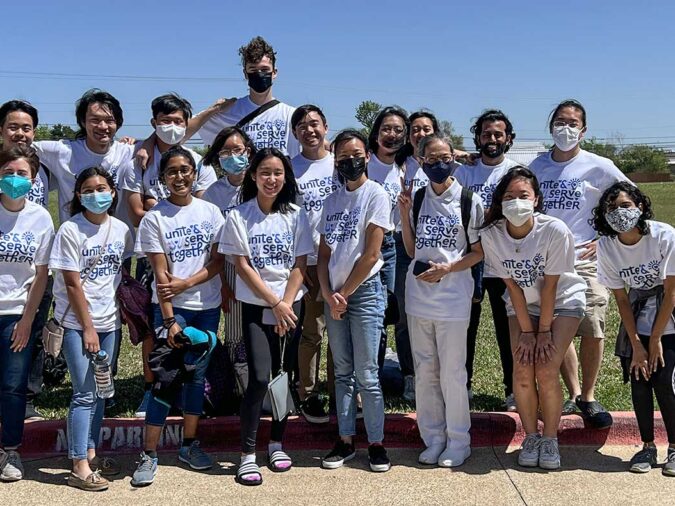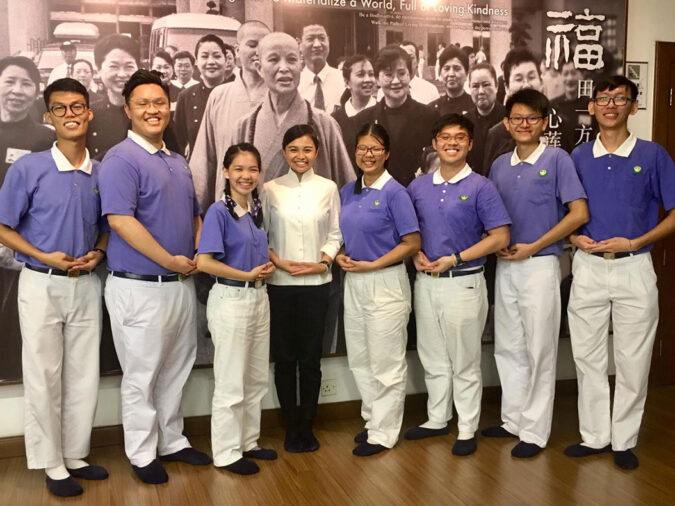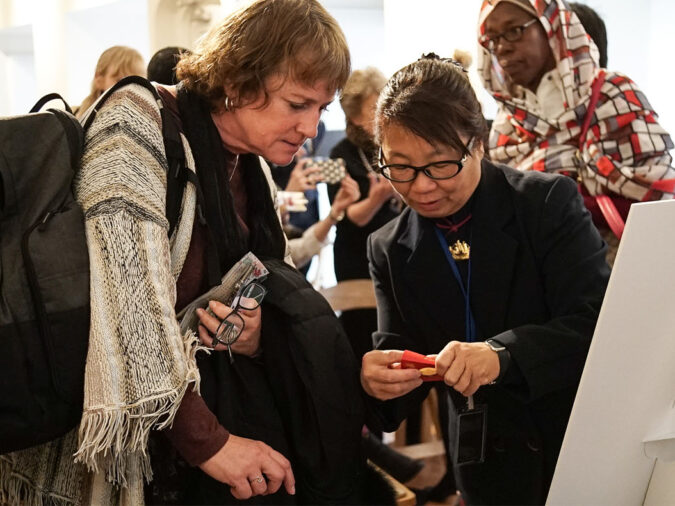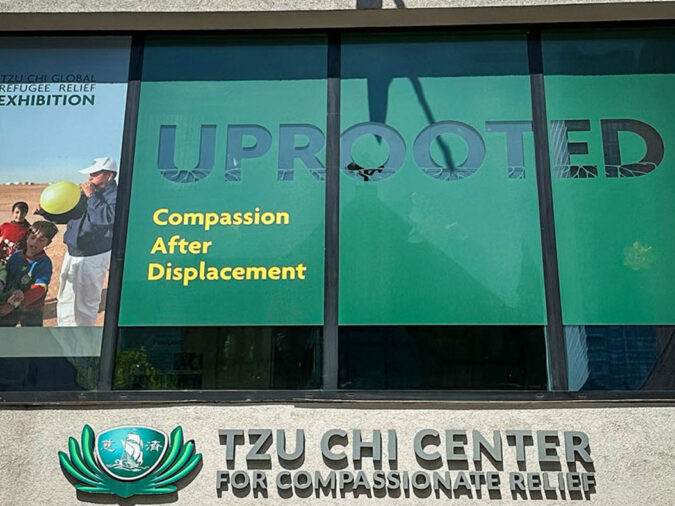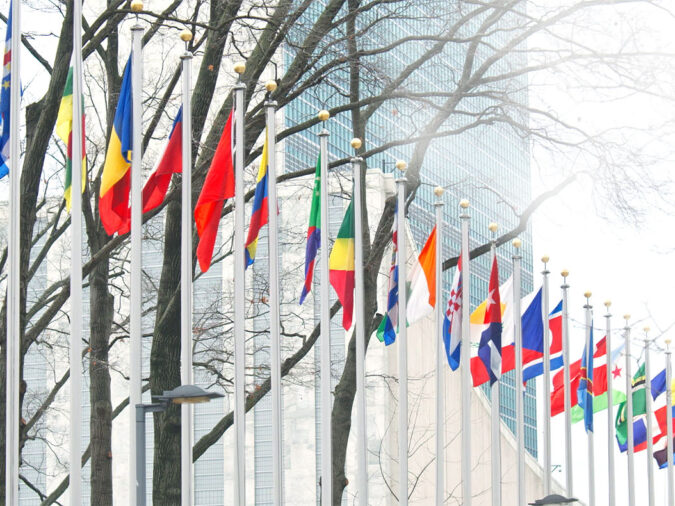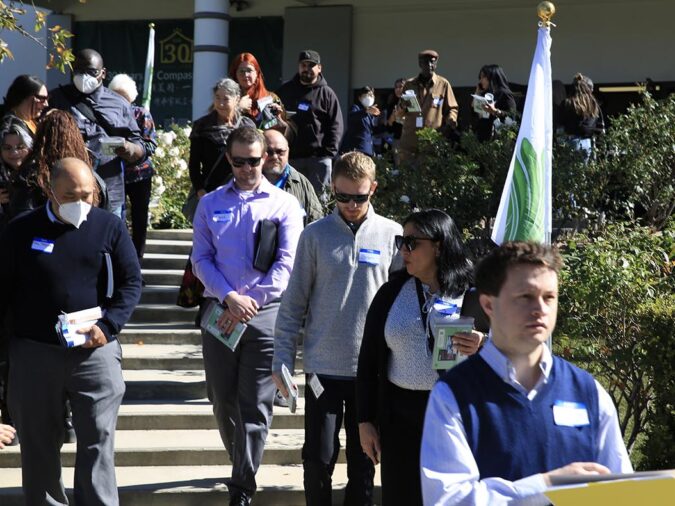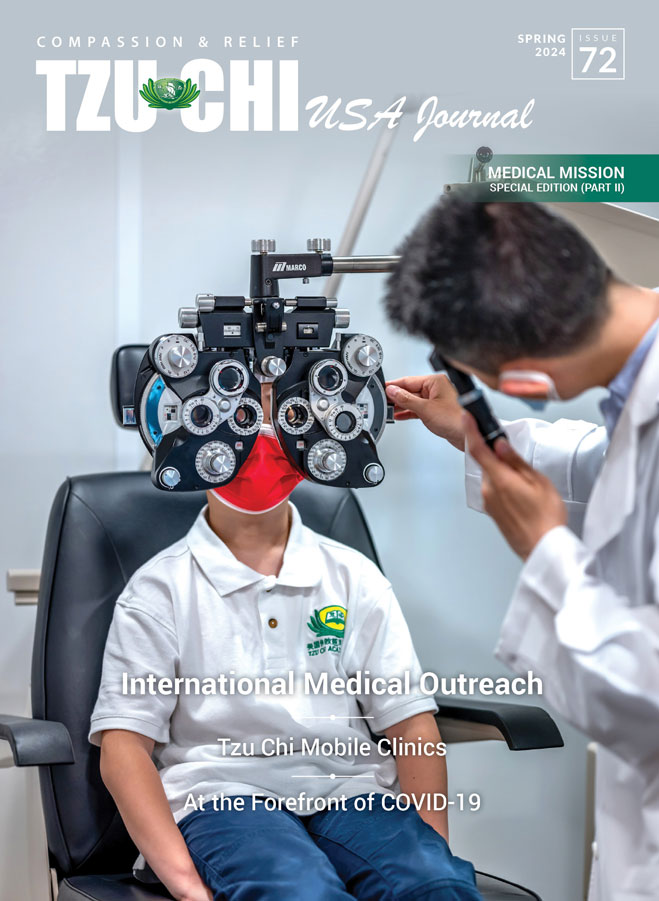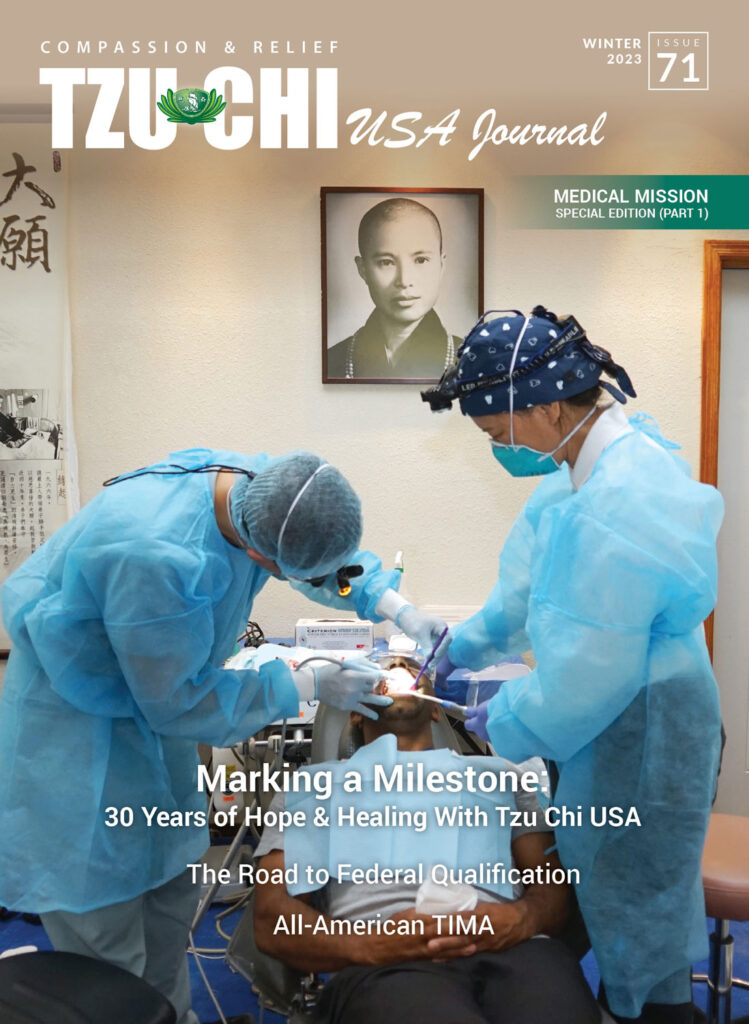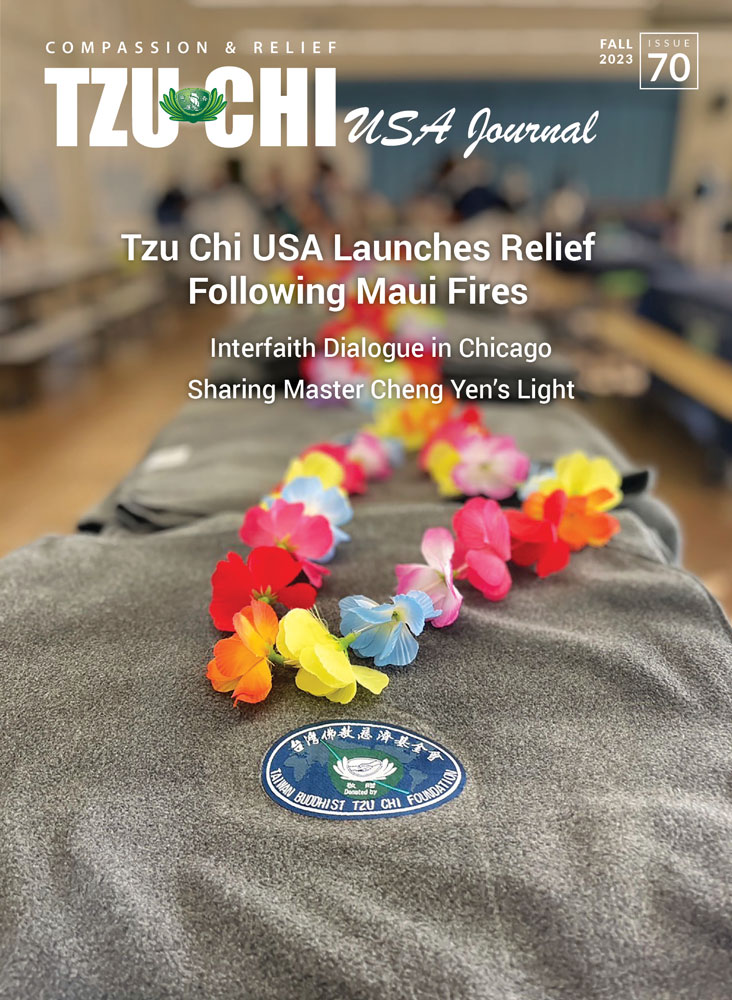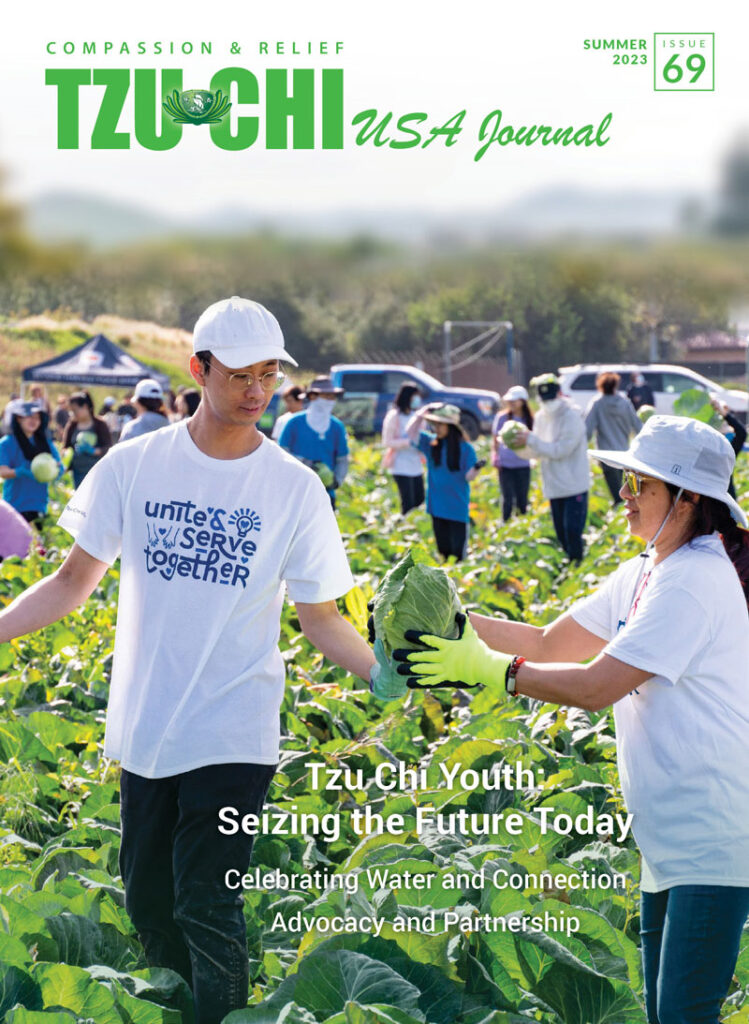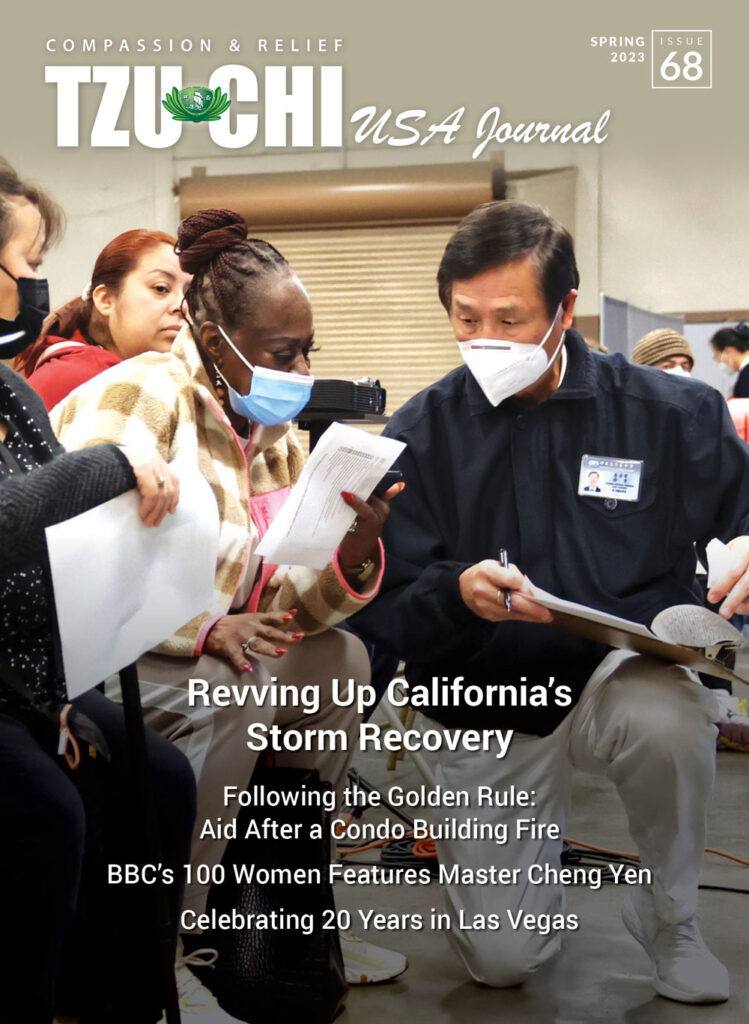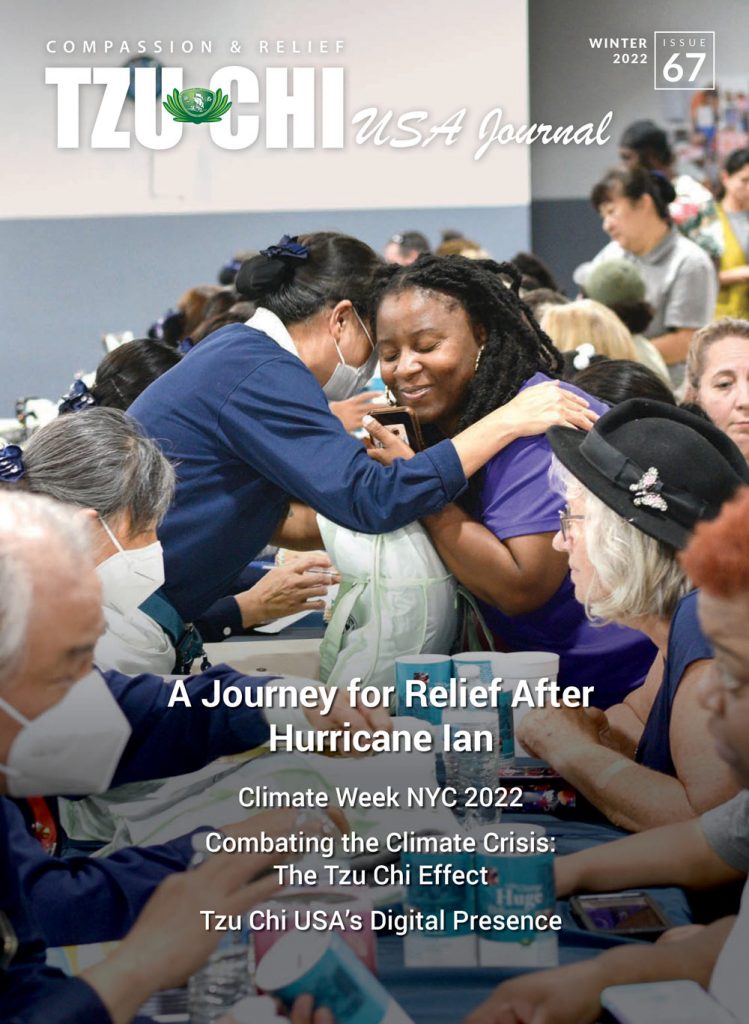CHAPTER 3
TIMA USA National Headquarters Region
Part 2
Written by Jixin Lin, Shuli Lo, Wen Ren, Dilber Shatursun, and Rujing Zheng
Translated by Ariel Chan
Edited by Chenglin Li and Pheel Wang
Published #71 | Winter 2023 Issue
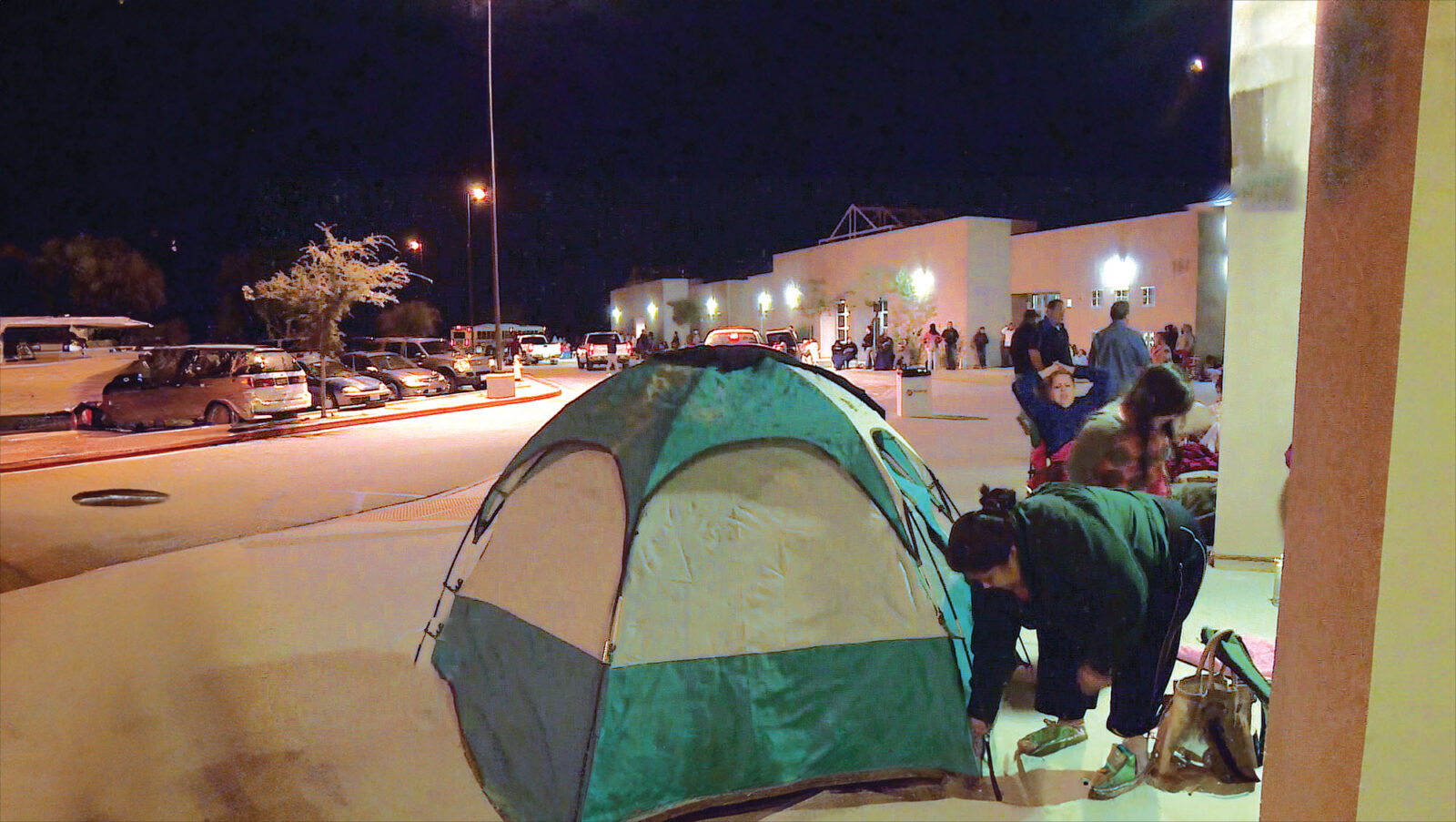
In 2012, Tzu Chi collaborates with Flying Doctors to organize a large-scale free medical clinic. Many people have already set up tents, chairs, and blankets outside the venue the night before, queuing up and waiting for medical consultations. Photo/US Tzu Chi 360 Video Screenshot
SHARE
East Coachella Valley
Southeast of Los Angeles, 130 miles away, lies the East Coachella Valley. It has fertile soil and booming agriculture, but the agricultural and industrial settlements are like a backward third-world country.
“Revealing the Invisible Coachella Valley,” a study by UC Davis (University of California, Davis), shows that local tribes govern this area because it is a Native American reservation. This designation means that federal law has limited jurisdiction here, so the federal government provides minimal subsidies to these areas, and essential public facilities are almost non-existent. At the same time, it is also a haven for illegal immigrants.
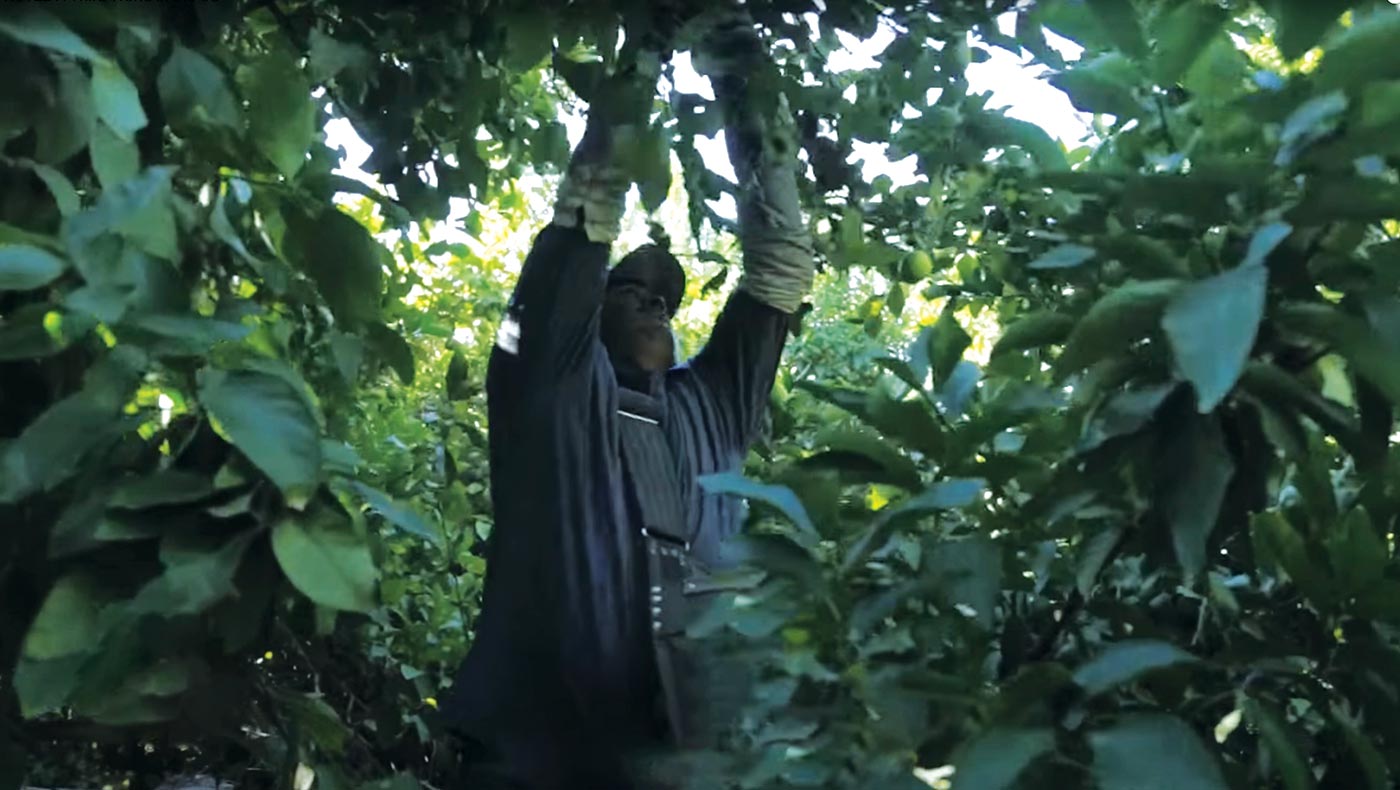
Eating Instant Noodles With Dirty Hands
“This area is mainly based on agriculture. We have a large area of farmland that produces many crops, such as dates, strawberries, peppers, and all kinds of things. Farmers all live here, and they harvest crops for a year. The economy contributes half a billion dollars, but these farmers are the most impoverished people, working in appalling conditions, and they don’t even have enough money to feed their families,” Rodolfo Piñon, Director of Community Development of Pueblo Unido, a local community building organization, explained. Living conditions in the East Coachella Valley are horrendous, with more than 15,000 migrant farmworkers living in more than 125 illegal trailer parks.
“When it rains outside, the house leaks and is damaged, but it’s our home, and we live here. We love it,” Santiago Zaragoza, an East Coachella Valley resident, said. The “home” he referred to was an old trailer over 40 years old. The entire trailer lacked electricity and had holes in the windows, floor, walls, and toilet. The family had covered the holes in the ground with wooden boards. “Spiders and snakes will enter through the holes if not covered. I’ve seen a big spider, this big,” Santiago’s sister pointed out, gesturing with her hands as she spoke.
Their mother, Myrnal Lopez, works alone and supports her family of five with a meager income. The only job she could find was picking fruits and vegetables in an orchard. At about 4:30 in the morning, before dawn, she comes to the orchard, steps on a ladder, and checks the condition of the fruits. She picks them if ready and packs them: “We pick the limes and put them in large containers. Sometimes, we can only fill one large box or one and a half boxes a day. If we pick two large boxes of limes in one day, we can earn $16. This is a heavy job. But it’s the only one where we can find work.”
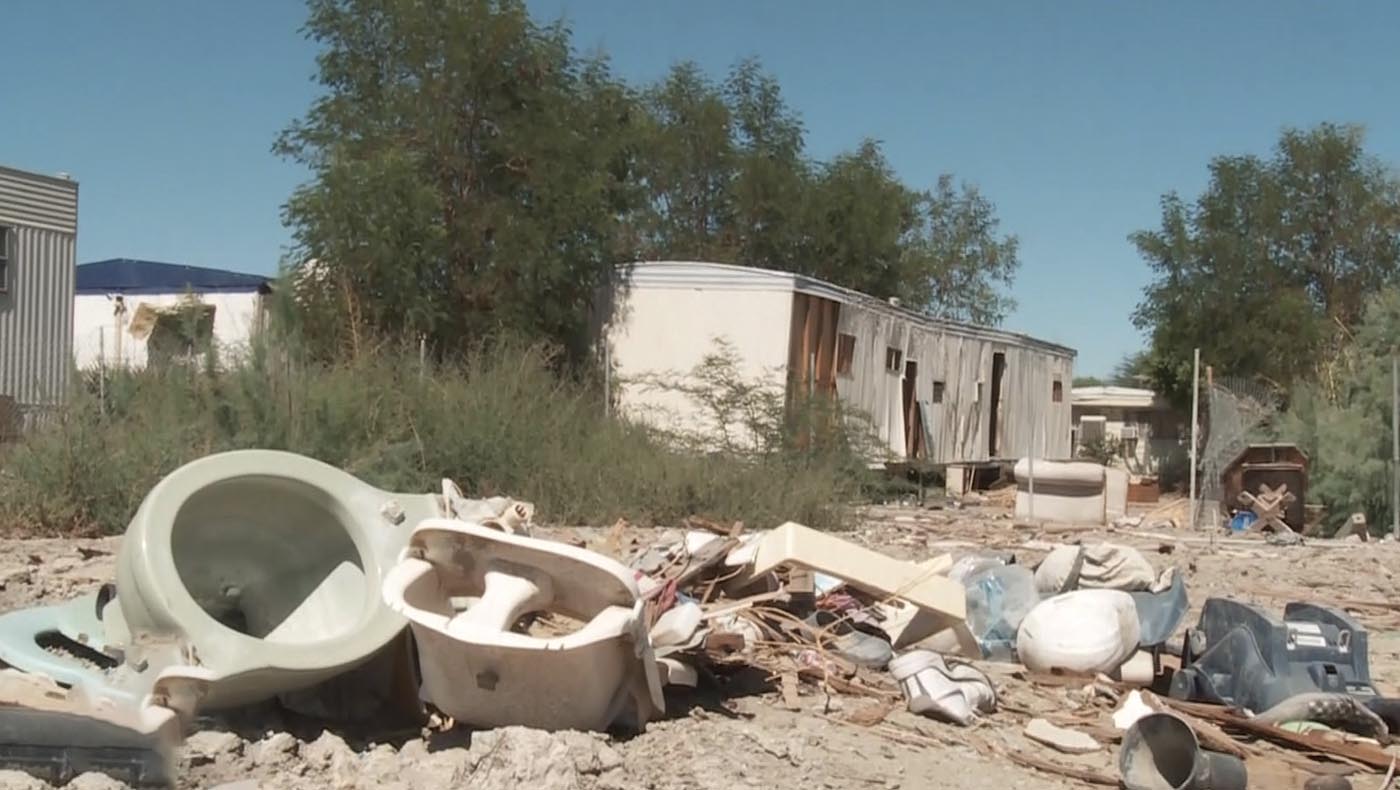
In addition to the disadvantaged living environment, the East Coachella Valley also lacks medical resources. The UCLA Center for Health Policy Research found that 36% of adults here have no health insurance, and this study only looked at adults with children, so it can only be said to be a conservative estimate. In addition, the report pointed out that many agricultural workers suffered from toxic neurological diseases due to inhaling large amounts of pesticides. Still, they had no money to see a doctor and had to fend for themselves.
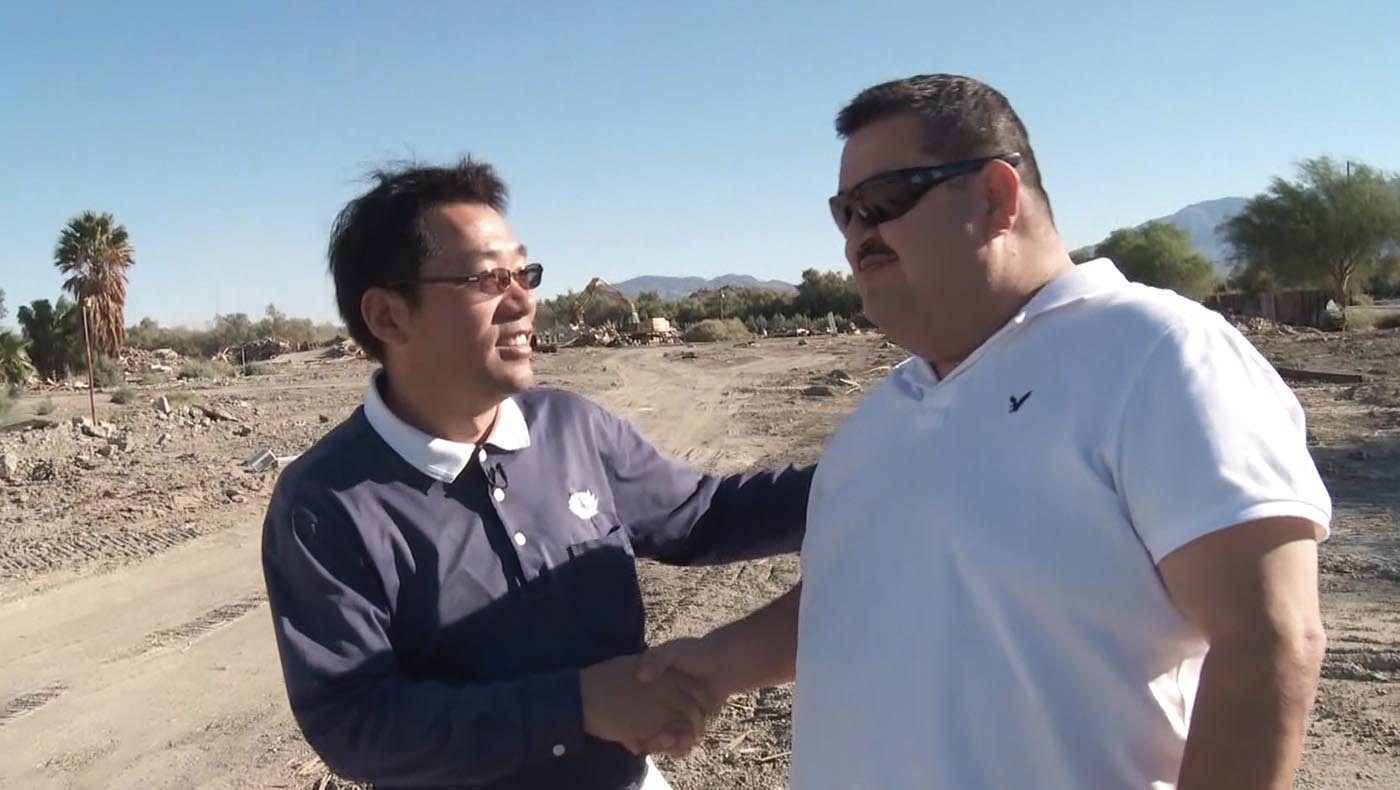
Through Facebook, David Hoy, a Spanish-speaking Tzu Chi and TIMA volunteer, reconnected with his high school friend Mario Beltran, who had grown up in the East Coachella Valley. “David Hoy told me that he was volunteering for a non-profit organization, Tzu Chi, and I thought maybe Tzu Chi could come and see if it could provide some resources and help,” Beltran said.
Accepting Beltran’s invitation, Hoy came to the East Coachella Valley and realized that this prosperous and powerful country has communities as impoverished as those here and that local farmers and workers have almost nowhere to seek medical treatment. Hoy couldn’t believe what he saw in front of him – the sky was full of dust, shabby trailers were everywhere, garbage piles, tattered clothes were hanging crookedly on the clothes-drying racks, and flies were flying all over. In the smog, a little boy about five years old held a bowl of instant noodles in his hand, pinched the instant noodles with his dirty fingers, and stuffed them into his mouth with a smile.
“You cook this for yourself?” Hoy asked the little boy in Spanish.
The child smiled and nodded, then grabbed a few more strands of instant noodles and put them into his mouth.
“You just add water?”
The boy nodded and licked his hands as he ate.
“Do you eat instant noodles every day? No real breakfast? No ham or eggs?”
The boy nodded again and told Hoy his mother didn’t have time to cook for him. The locals here had no way to seek help to escape the hardships of poverty, hard farm labor, poor nutrition, and health problems.
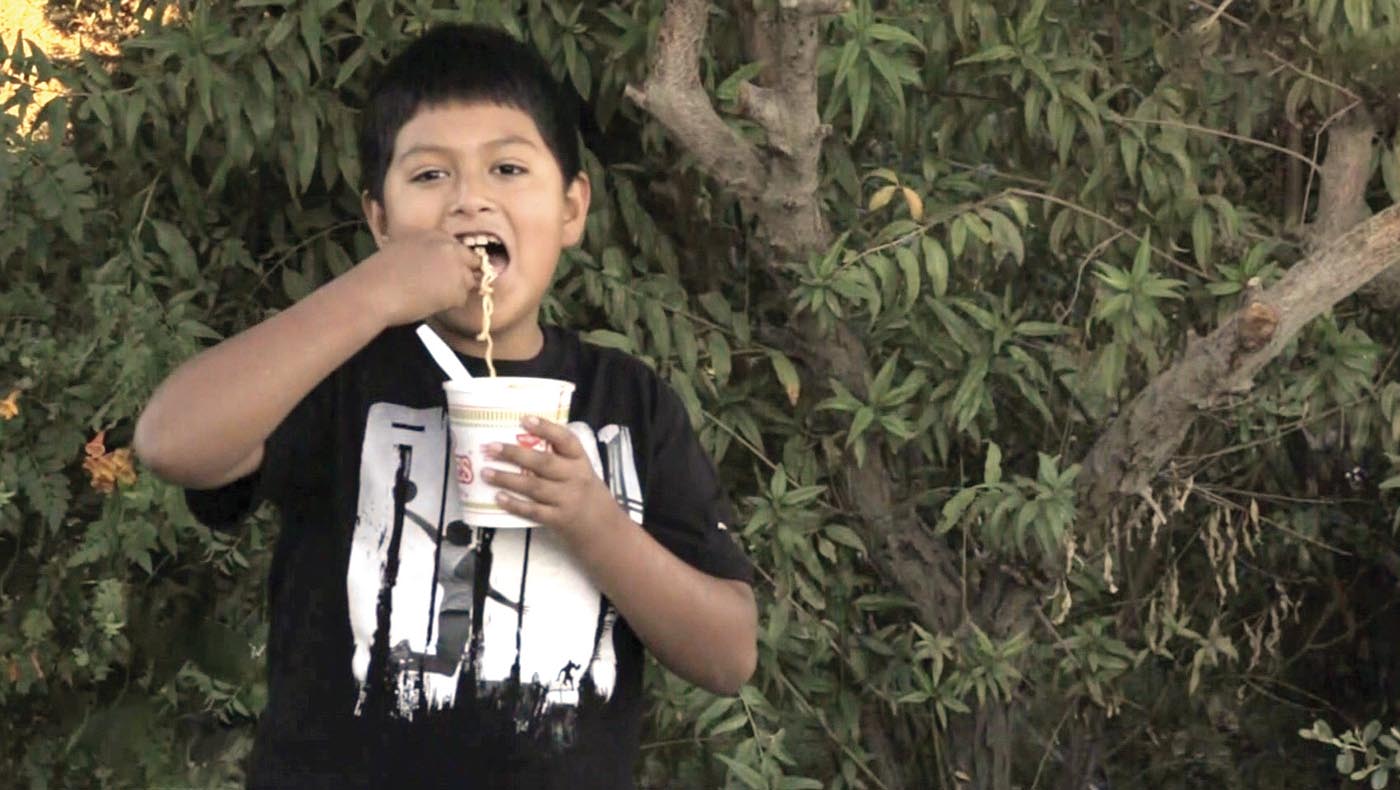
Collaborating With Flying Doctors
In 2011, TIMA USA National Headquarters Region volunteers first went to the East Coachella Valley area to vaccinate many residents who had never received a flu shot. In 2012, they took the initiative to join forces with Flying Doctors of America to hold a large-scale free clinic event, outreach that spanned several days.
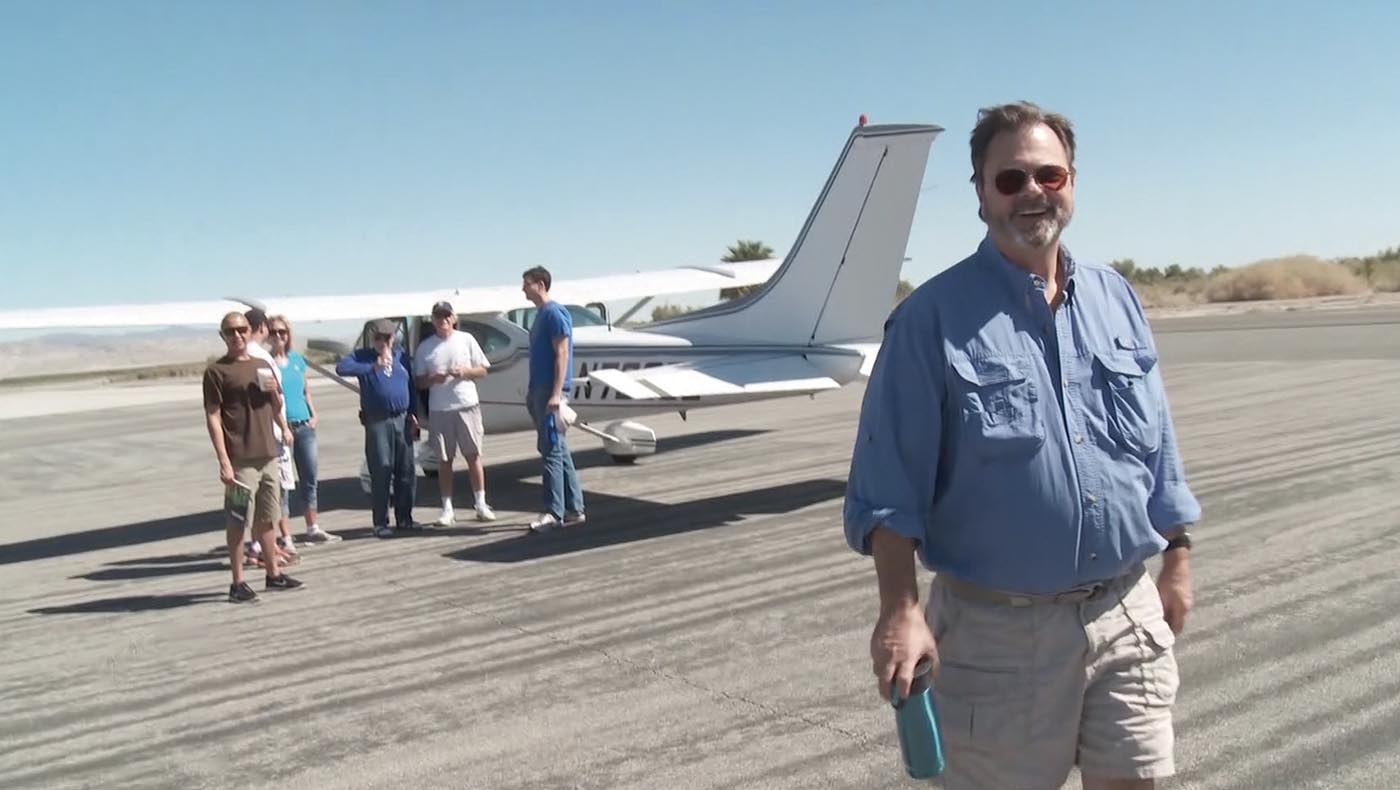
Flying Doctors of America is a famous medical volunteer organization in the United States that has provided free medical services since 1990. Medical volunteers will fly, some in their private aircrafts, to various parts of the nation, especially areas without access to medical assistance, to provide free care to the residents there.
In Tzu Chi’s collaboration with Flying Doctors, both parties provided medical staff. TIMA and Tzu Chi volunteers were also responsible for providing all mobile medical equipment and taking on the tedious work of setting up the free clinic venue. In addition, they also conducted in-depth publicity in the community to inform more local residents about the event. “It really surprised me when one of these farmworkers told me that he had never been to the dentist in his life. He told me that he had no money, so he couldn’t go to the dentist, and the free clinic was very important to him. This would be the first dental visit in his life,” TIMA volunteer David Hoy recounted. He went door-to-door to inform residents about the large-scale free clinic event the next day. They were overjoyed, exclaiming, “See you tomorrow!”
I’m very grateful. These farmworkers work hard every day so that we have food to eat, and we must do something for them.
David Hoy
TIMA Volunteer
But actually, people met each other even earlier. A long queue had already formed outside the venue the night before the medical outreach. Some patients came to line up at eight o’clock in the evening and sat outside the venue wrapped in blankets. It was drastically cooler at night, yet they waited all night in the cold to see a doctor. “I’m waiting for my eye exam,” one patient said expectantly, bundled up in a blanket to stay warm.
Before the medical outreach began, Flying Doctors volunteers quite literally flew in. Helicopters descended from the sky, and doctors, hygienists, and volunteers stepped out, introducing themselves. “I’m Larry Tabor, a San Francisco Bay Area dentist,” one said.
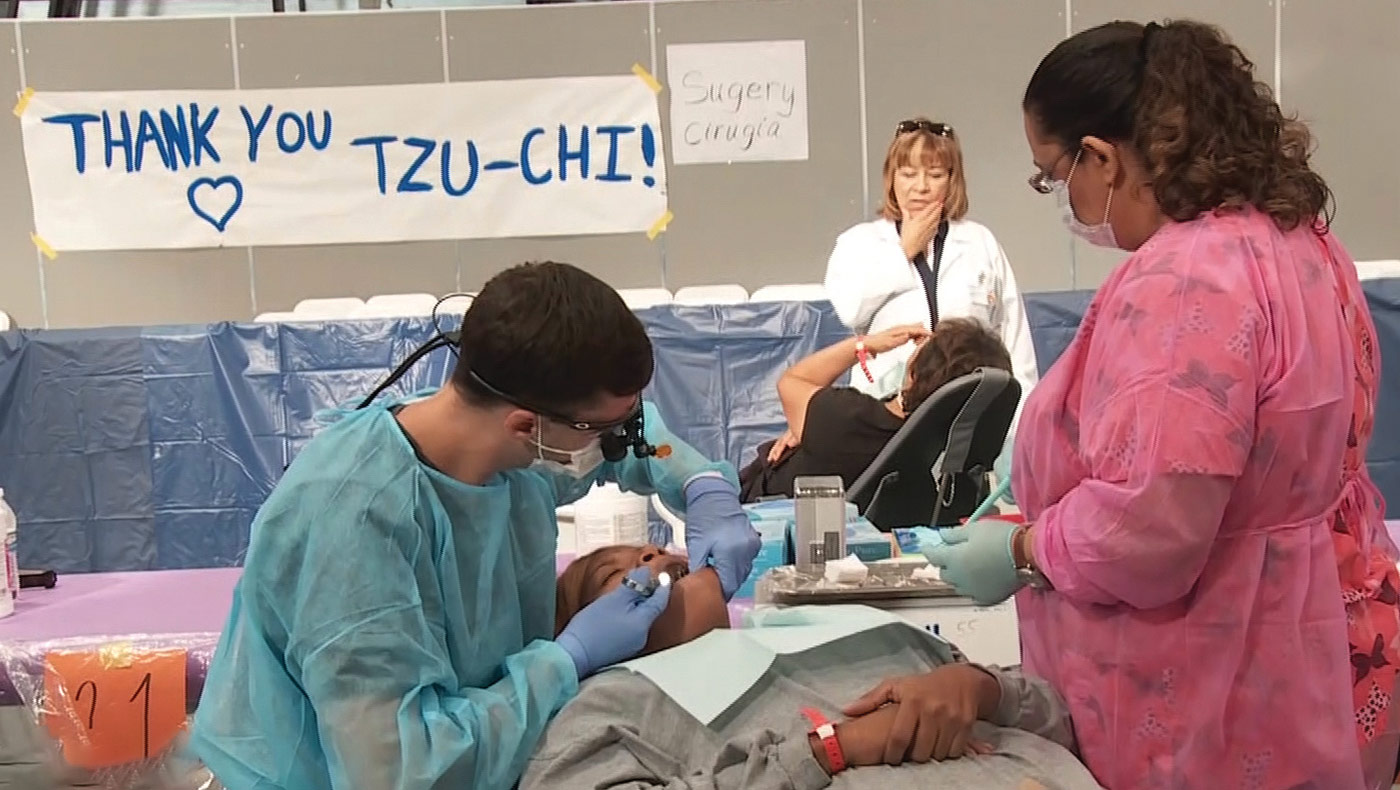
On their part, TIMA volunteers drove several hours to reach the designated medical outreach location, bringing medical equipment. They then began intensive preparations, installing portable dental chairs and various equipment at the venue.
“We brought a lot of dental equipment, as well as acupuncture and medical equipment. Except for ophthalmology, Tzu Chi provided all the equipment,” Steven Voon, then Deputy CEO of Community Promotion at the Buddhist Tzu Chi Medical Foundation, explained.
It’s really good to come to Tzu Chi’s medical outreach event to help out because all the medical equipment here, such as ultrasound equipment, is something you can’t see in other free clinics! With this equipment, we can be more efficient in providing medical treatment locally and serve more people.
Joan Abittan
Flying Doctors of America Dental Hygienist
Patients filed in on the first day of the free clinic as soon as the doors opened. The venue provided various medical services such as dentistry, ophthalmology, acupuncture, and Traditional Chinese Medicine (TCM) cupping. Half of the patients at the site were farmworkers, and this was their once-in-a-lifetime opportunity. “We can only see 300 dental patients a day, but more than 500 people came to the site,” Karen Torres, a Flying Doctors volunteer nurse, said while controlling the flow of people in and out.
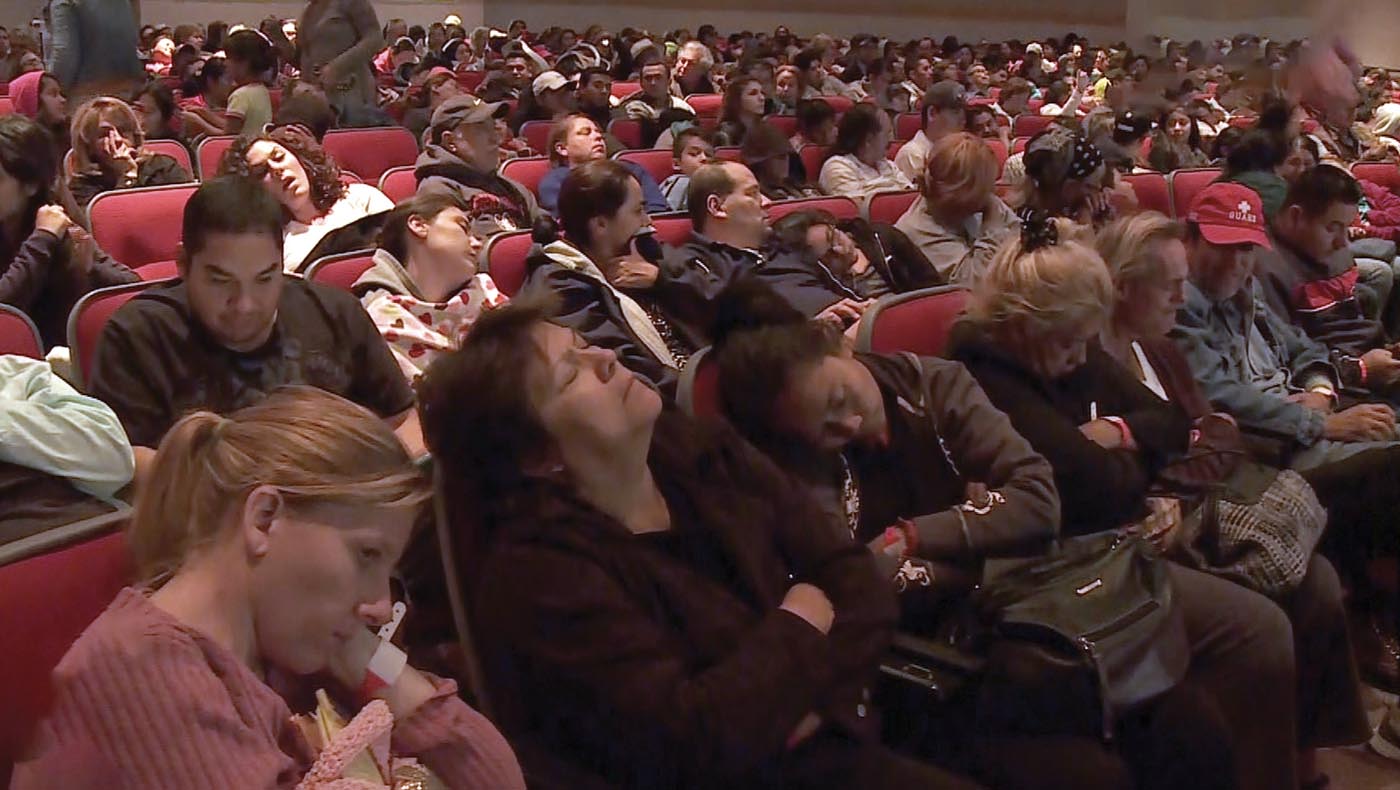
“Here in the Coachella Valley, a lot of residents have oral disease issues, and we see a lot of people with gum disease and a lot of people with multiple cavities at one time,” Flying Doctors dentist Larry Tabor said. As TIMA dentist Shirley Chen treated a patient, she shared, “He has a lot of cavities, almost twenty in his mouth.”
In addition to dentistry and ophthalmology, TCM treatments were also very popular at the free clinic event. Since many local agricultural workers do hard work, they often suffer from pain and other problems. “We’ve been here in the Coachella Valley area since 2011. Most of the patients we’ve seen in the past two years have some pain problems,” Dr. Shincung Chen, a TCM practitioner and TIMA member, recounted.
“What a miracle!” After receiving acupuncture, the patient felt that his whole body was much more relaxed and pain-free.
“How do you feel?” the doctor asked.
“So much better!”
Dr. Tabor has cooperated with many organizations. He was deeply impressed by Tzu Chi’s sincere care for patients from beginning to end: “Unlike other groups that hold large-scale free clinics, where they come in to set up equipment and then leave, Tzu Chi has excellent follow-up services.”
The TIMA volunteer team, including Steven Voon, worked step by step to build a good reputation for Tzu Chi’s free clinics. “As we become more professional in organizing free clinics, other partners will want to work with us,” Voon concluded.
The multiple-day free clinic event in the East Coachella Valley benefited thousands of people through the medical services provided. TIMA and Flying Doctors of America volunteers were busy until late each night. Seeing the patients leave with satisfied smiles and their pain relieved, Tzu Chi volunteers felt genuine happiness in their hearts.
Santa Ana
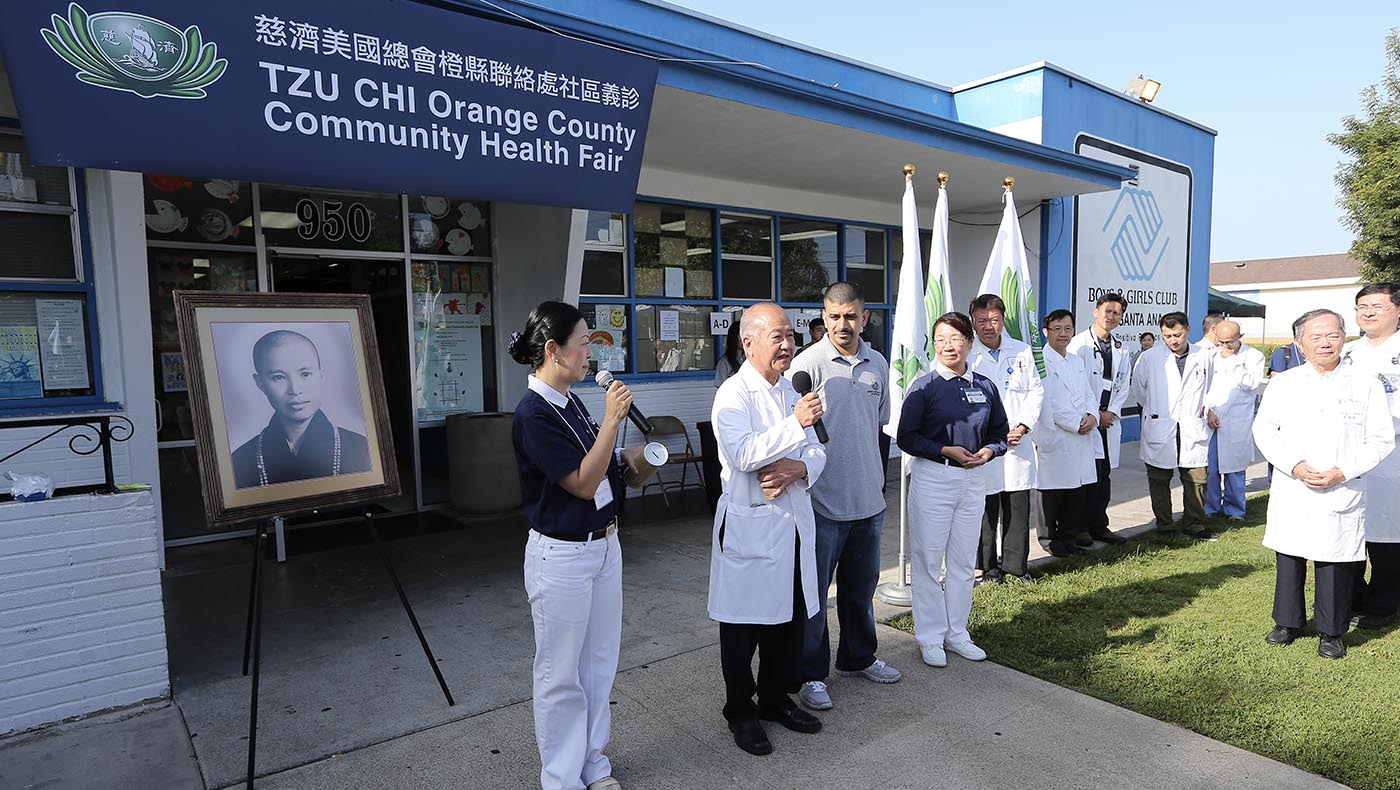
“I don’t have insurance!” “Is it really free?” “Will you come again next month?” Every time there is a large-scale free clinic, the patients who come after hearing the news always ask such questions. There are two wealthy cities in Orange County, Southern California: Anaheim and Irvine. Neighboring Santa Ana is only a five-minute drive away, but it is an immigrant community living below the poverty line.
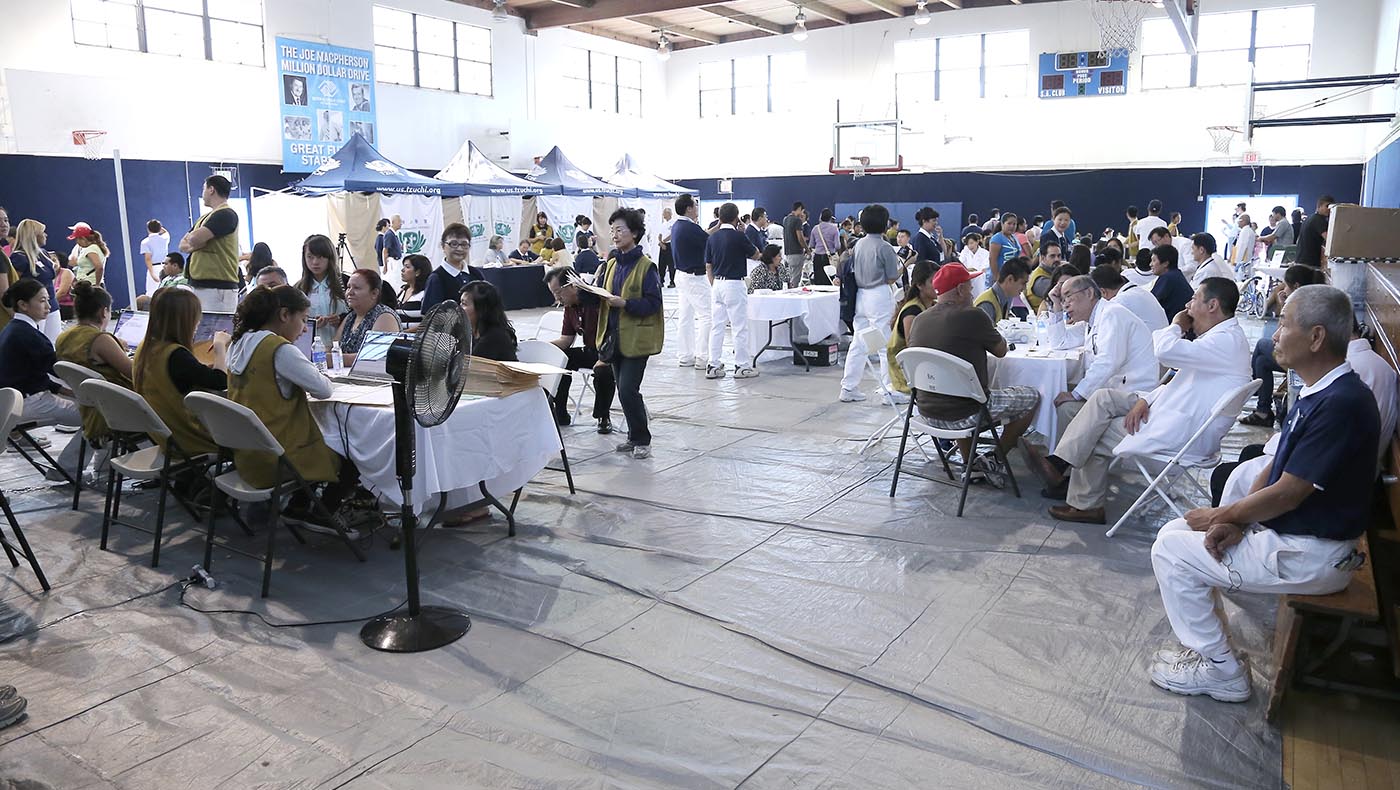
On one free clinic day, around 6:30 in the morning, when the sky just got bright after dawn and the volunteers were still setting up the venue, people started queuing up on the lawn outside the Boys & Girls Club of Santa Ana. “Good morning. How early did you come to line up today?” the volunteer asked as he greeted the young man who was first in line. “Six-thirty,” he replied, smiling shyly. He said his friends who lived next to the Santa Ana Club saw the flier and told him there was a free clinic today, so he came to check his teeth.
Parents came, followed by several children. Mothers pushed their youngest in strollers, accompanied by their elementary school-aged siblings. A few people arrived alone and slowly walked into the tent on the lawn outside the Santa Ana Club, with a bit of uneasiness and shyness in their eyes. After being greeted cordially by Tzu Chi volunteers and Spanish-speaking community volunteers wearing vests, they filled in their preliminary medical history information with the volunteers’ help.
Tzu Chi has been protecting the Santa Ana community since 1989. Every August, the “Happy Back to School Day” is one of its most important projects. Tzu Chi volunteers provide services to disadvantaged families (including low-income families, those experiencing homelessness, those in foster care, etc). When students received new backpacks and stationery supplies, and the volunteers interacted with them and teachers, they discovered that the families here also had urgent medical needs.
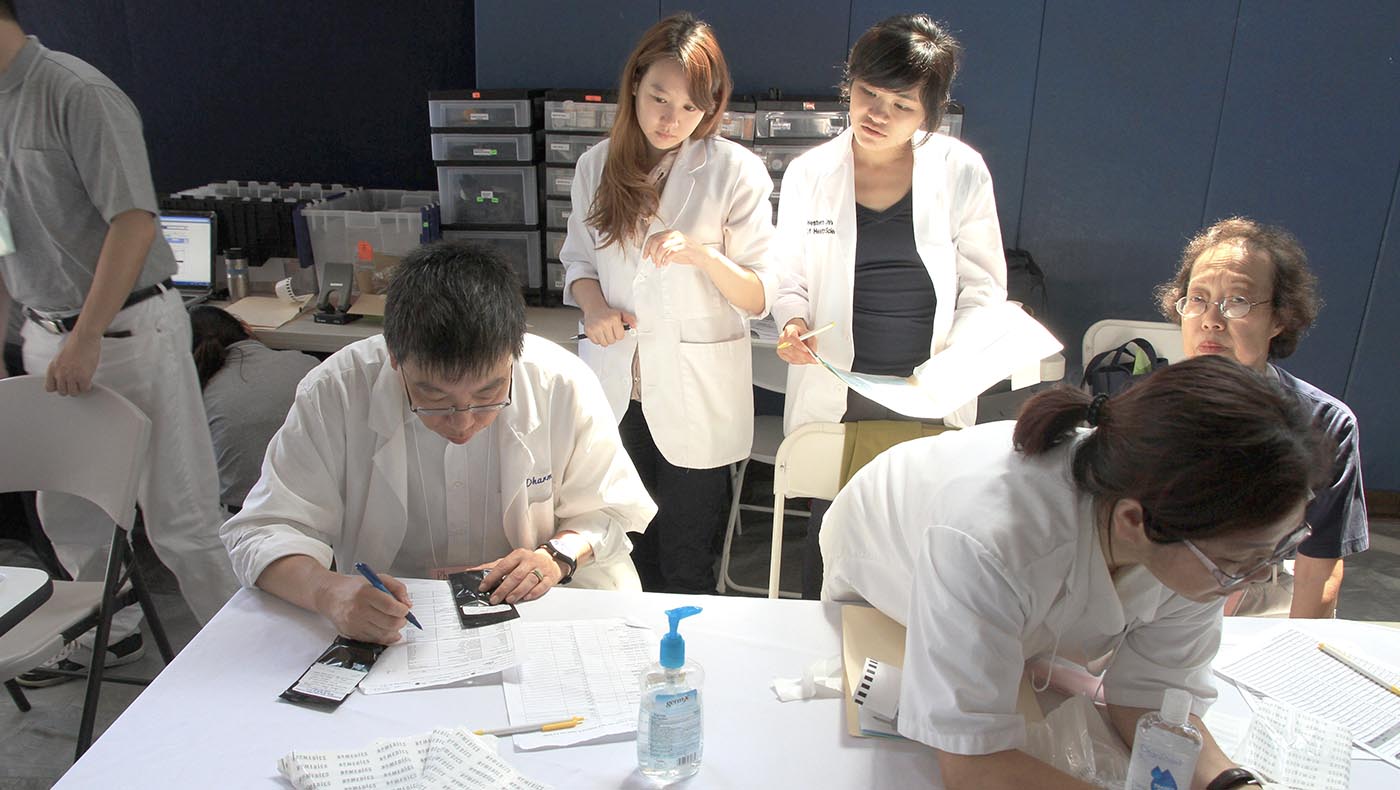
The Orange County TIMA chapter was established in 2002. In 2003, it entered Santa Ana primary schools to teach dental hygiene to schoolchildren and established seminars on health in Orange County. Later, it paused its activities due to dental care plans provided by the school district. In 2011, Orange County started the first Happy Campus backpack food distribution in Santa Ana and found many families lacking dental insurance. Orange County volunteers held the first free clinic in Santa Ana in 2012, protecting the health of residents and pushing beyond missions of happy campuses to happy families.”
Wendy Kung
TIMA Registered Nurse
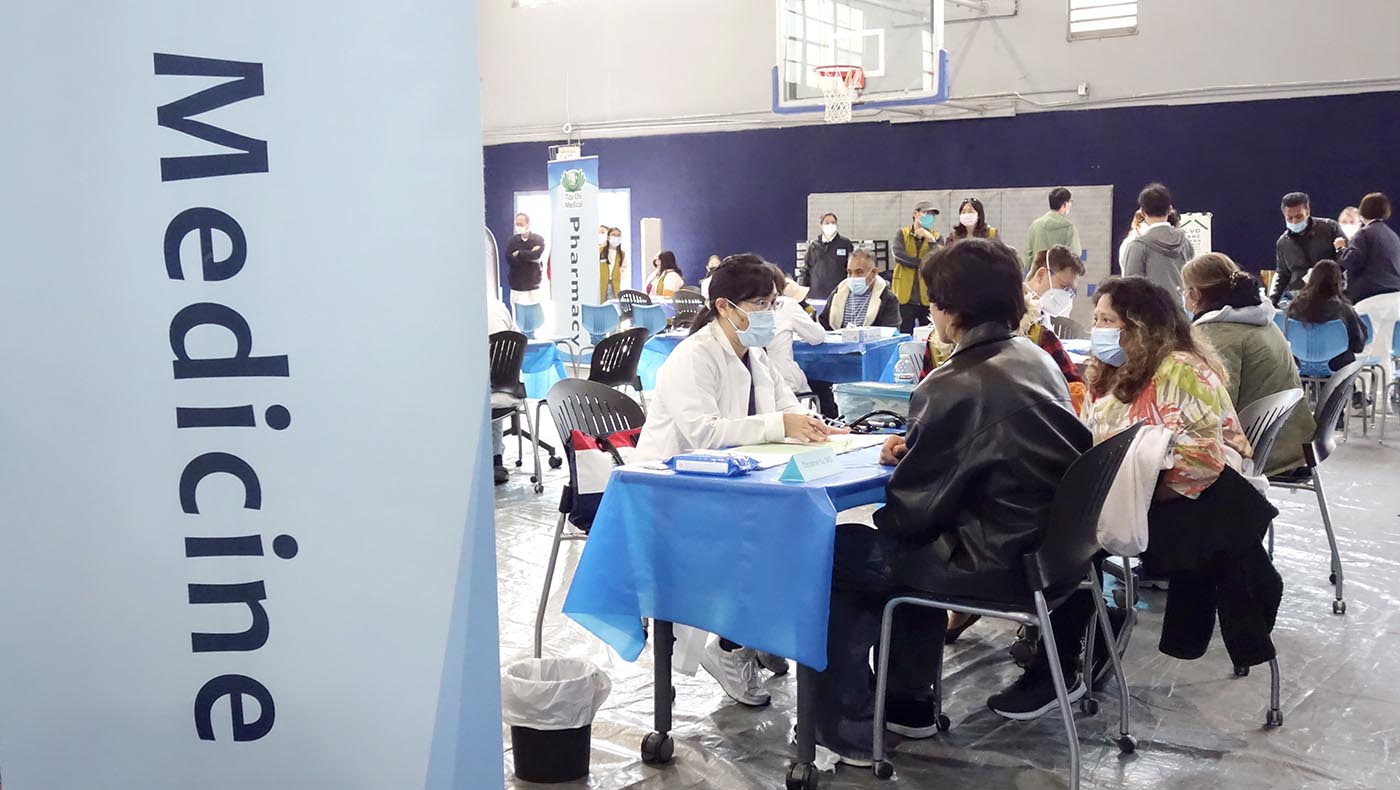
San Diego
“As early as 2013, Tzu Chi had already held charity medical free clinics in the Oceanside and Fallbrook communities of San Diego, California. At that time, Hue Wang was the medical team leader, and this was also the beginning of my participation in Tzu Chi’s free clinics,” Tzu Chi and TIMA volunteer Mark Ostrander recounted. “We then held a free clinic in Boulevard, San Diego County, on the U.S.-Mexico border. At that time, there were no medical clinics here at all, and residents had to drive more than 70 miles to find a doctor for treatment, so I organized a free clinic here. I remember that we provided about 50 to 60 dental services for free dental clinics. Since then, we’ve held regular free clinics twice a year,” he explained. Since Tzu Chi began to provide help in the area where he lives, Ostrander has been responsible for the tasks related to the free clinic.
A Repurposed Fire Station
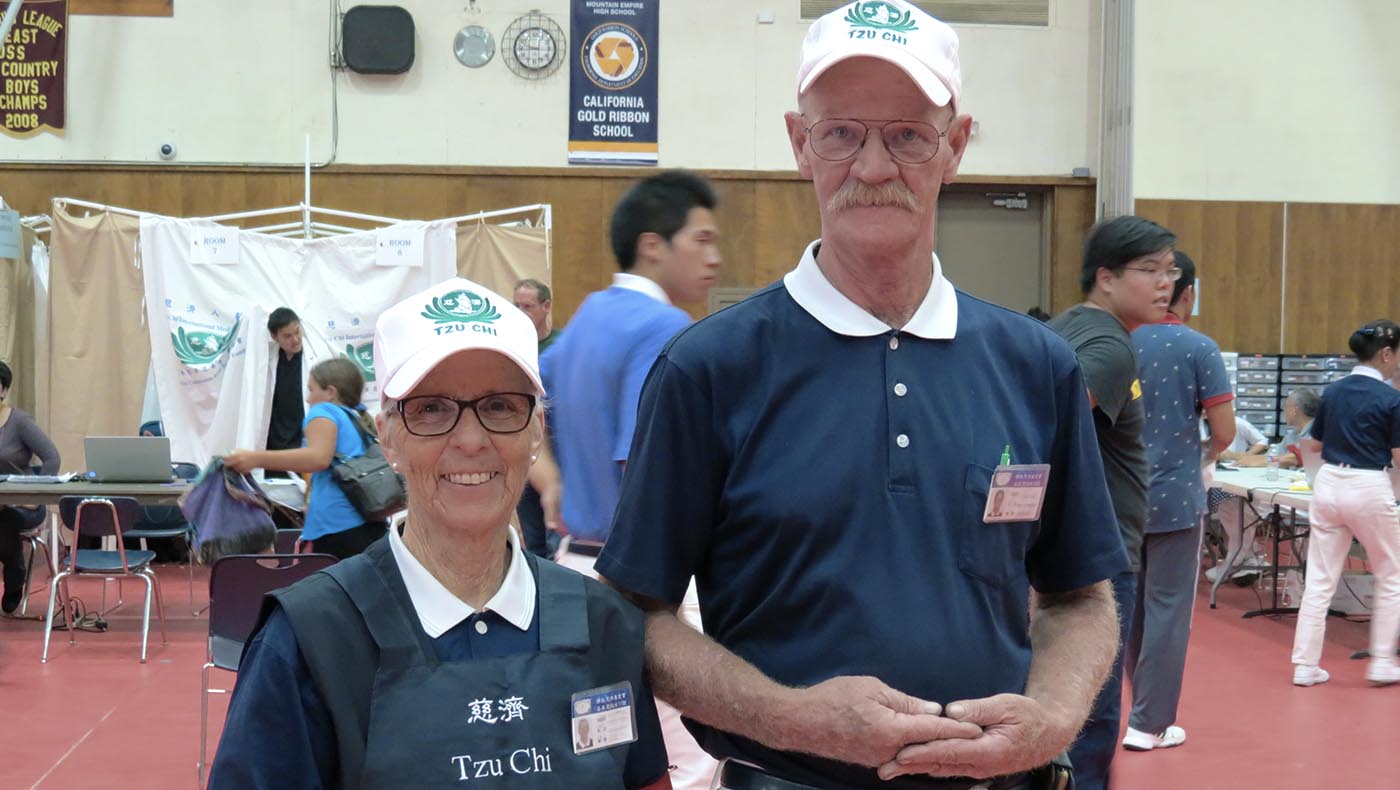
The rural communities along the border between the United States and Mexico have a small population. On the one hand, this is where the American dream begins for many new immigrants. They are non-native English speakers, most of whom speak Spanish as well as many other languages, even Mandarin, as undocumented immigrants come from all over the world. Immigrants have no health insurance, bring their families with them, and often come from low-income families. On the other hand, many impoverished older people are living alone in this community. They suffer from poverty and illness, and some can’t even go out all year round due to physical reasons. Tzu Chi exists to bring help and care to these people in need.
“The first large free clinic was in 2015 in Campo [an unincorporated community in San Diego County] at Mountain Empire High School, next to an Indian reservation. If I remember correctly, I believe we had 92 patients. We provided acupuncture, dental, and vision services at that event,” Mark Ostrander recalled. Opening a free clinic can’t be accomplished overnight. There were few patients initially because the locals knew nothing about Tzu Chi or its free clinics. People’s understanding of Tzu Chi deepened by word-of-mouth over time and through interactions as volunteers helped those in need, offering charity aid, conducting home visits, and providing disaster relief. “Some people saw results after coming to the free clinics, and then at the next free clinic, more people made appointments. Eye exams and acupuncture services were the most popular,” Ostrander said.
At the same time, finding local doctors willing to provide free clinics is one of the many challenges. Ostrander still remembers the first dentist who worked with Tzu Chi in 2015, May Chou: “She was an older dentist, but she knew other dentists while she had retired by then. She was the first one I remember, introduced by volunteer Hue Wang.”
In 2018, a local non-profit led by Ostrander purchased an old fire station locally and converted it into a Resource Center. Ostrander calls it Tzu Chi South, as they routinely interact and work with Tzu Chi San Diego. Local people can come here to receive free supplies from the weekly Food Pantry, participate in a Mattress Recycle Program, and use it as a household recycling drop-off, which Tzu Chi San Diego helps run. At the same time, it also provides local residents with medical assistance. “We can provide dental and acupuncture services in this building. We’ve successfully integrated this facility into the assistance work and gained the community’s support,” Ostrander explained.
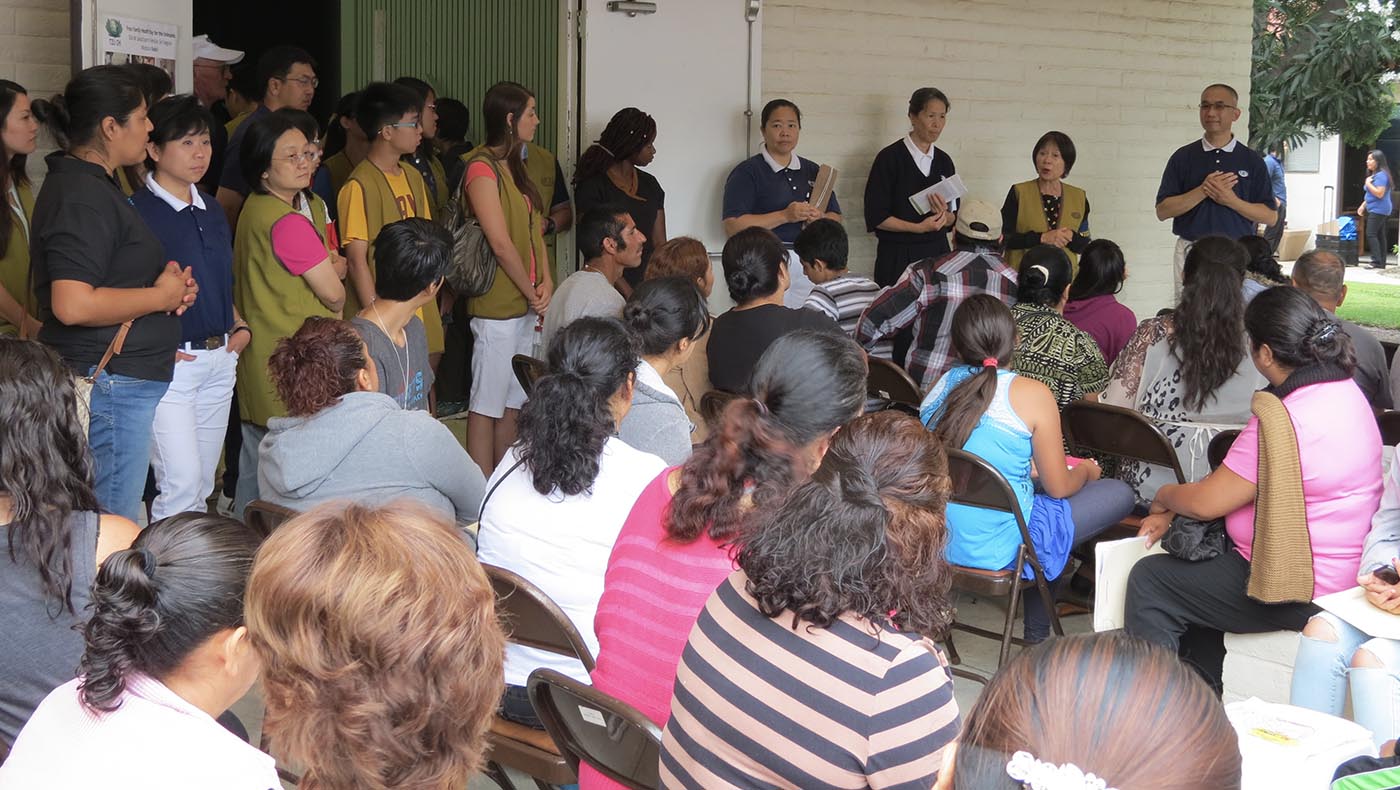
Since 2018, TIMA has held a large-scale free clinic here, with as many as seven dentists, four acupuncturists, two optometrists, an ophthalmologist, and 30 non-medical professional volunteers participating.
Roger Wilson came to see the doctor with neuropathy that left him almost unable to walk. During the free clinic in 2018, Wilson arrived in a wheelchair. “He needed glasses. Together with other volunteers, we carried him to the Tzu Chi Eye Clinic for a vision examination and glasses. He got a pair of glasses, and at least now he can read,” Ostrander said with great relief. Wilson relies heavily on a wheelchair and a lift chair for daily life. The chair lift has become a place for him to sleep because he can’t climb into bed to rest. Once, when Ostrander and volunteers visited Wilson’s home, they found that his lift chair was broken: “We helped him purchase a new lift chair through Tzu Chi’s charity services.”
“Merry Christmas!” Several children surrounded Santa Claus with joyful faces. The tall Christmas tree behind them sparkled with small decorations such as snowmen, angels, sleds, and reindeer. In this joyous and peaceful atmosphere, people took photos with Santa Claus one after another. “It’s Christmas again!” they shouted. Each year around this time, Tzu Chi volunteers in San Diego hold Christmas activities with Bruce playing Santa Claus. However, just a few years ago, he couldn’t walk since he couldn’t see.
“An older person came to the eye examination point in Boulevard. Through the eye examination, Tzu Chi volunteers discovered that he had difficulty with his vision,” Ostrander recounted. “We managed to provide him with the surgery he needed to correct his eyesight. I think it’s very touching that he needed someone to guide him because he had difficulty seeing when he came. But after the surgery, he volunteered to participate in Christmas activities and play Santa Claus, and he always remembered Tzu Chi and talked about it.” In Ostrander’s recollections, this is the most touching thing he ever encountered. Whenever he thinks about it, he feels warmth in his heart that inspires him to do more good deeds and help more people in need.
We even had a special Santa costume made just for him in the right size because he’s a pretty tall guy.
Mark Ostrander
Tzu Chi Volunteer
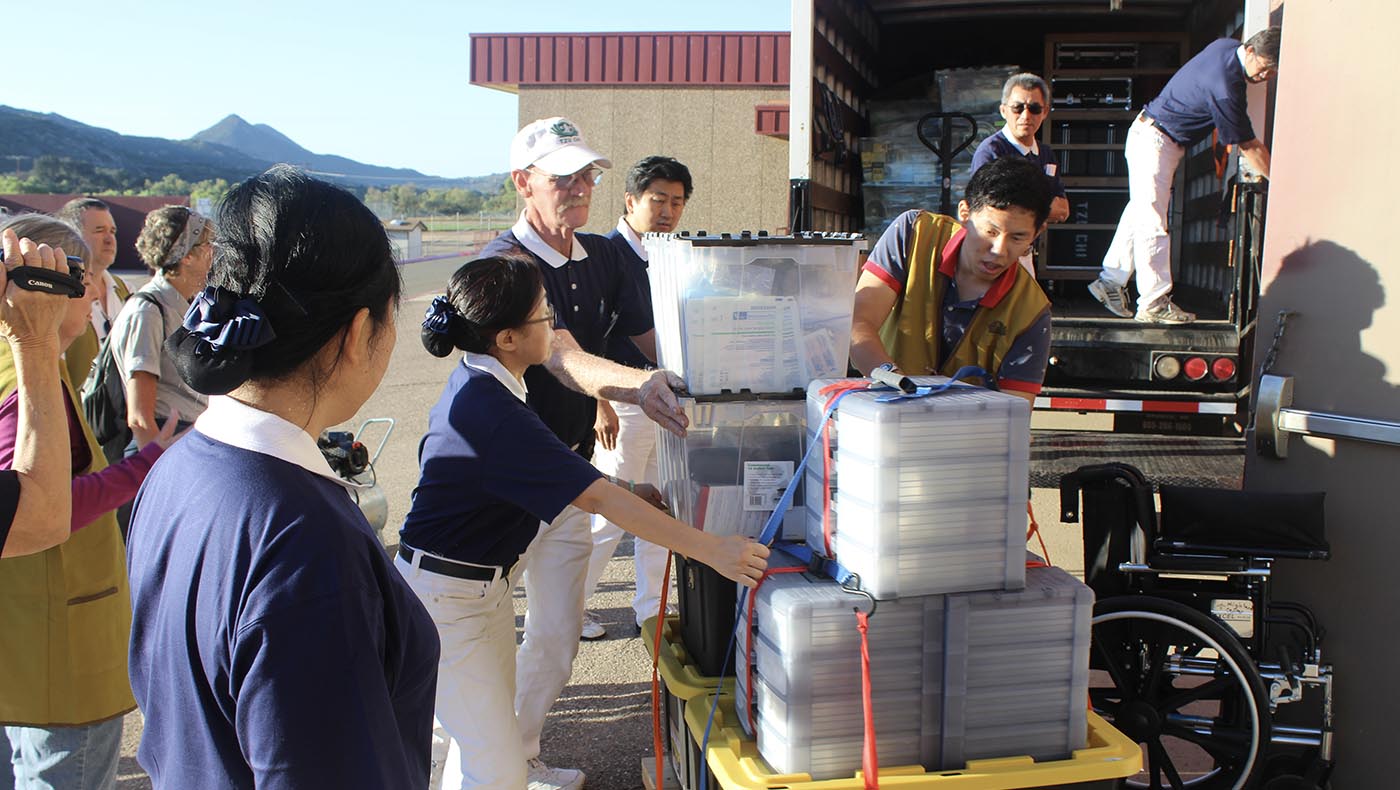
A Place for Lonely Older People
Mark Ostrander actively partners with local charities. First of all, there are many impoverished and lonely older people in the area, some of whom are even bedridden all year round due to illness. Tzu Chi volunteers try to bring such individuals to Tzu Chi’s free clinics for medical treatment and health check-ups. The volunteers also help them connect with programs like PACE (Program of All-inclusive Care for the Elderly), whose professionals can pick them up, take them to the doctor or to shop, and provide various activities to keep them active.
Secondly, volunteers at the Tzu Chi USA San Diego Service Center can’t operate so many medical services entirely independently, so Ostrander contacted local organizations and recruited volunteers from the San Diego County Fire CERT (Community Emergency Response Team), American Red Cross, and the community. When these volunteers participate in Tzu Chi’s free clinic activities, Ostrander will provide them with training, including the operation of Electronic Health Records, Tzu Chi’s operating methods, and central values.
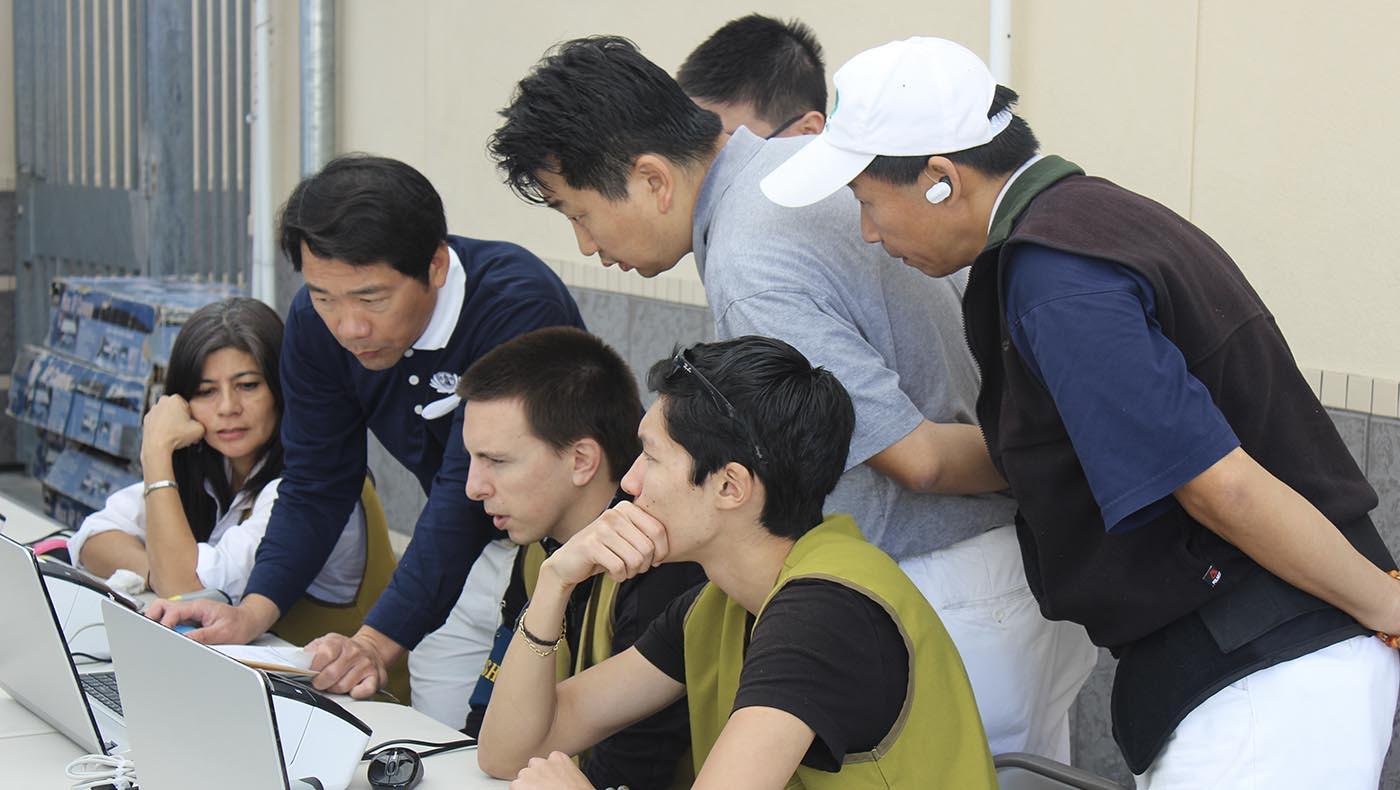
“I’ll explain to them why we do this, that there are no strings attached to our charity, that we’re grateful for the opportunity to serve, and that we serve with compassion,” Ostrander said. “All the people who come to help say that they feel very happy and satisfied every time they provide services to the community with Tzu Chi. They may feel tired, as sometimes the work of the volunteers is very hard, and sometimes the people who come for treatment may be impatient with the volunteers. Still, they said that because of the sincerity of Tzu Chi volunteers, the overall atmosphere of the free clinic is warm and welcoming, and they feel very happy to serve the underprivileged and sick side by side. They always ask, when is the next free clinic?” Speaking of this, Ostrander was full of pride.
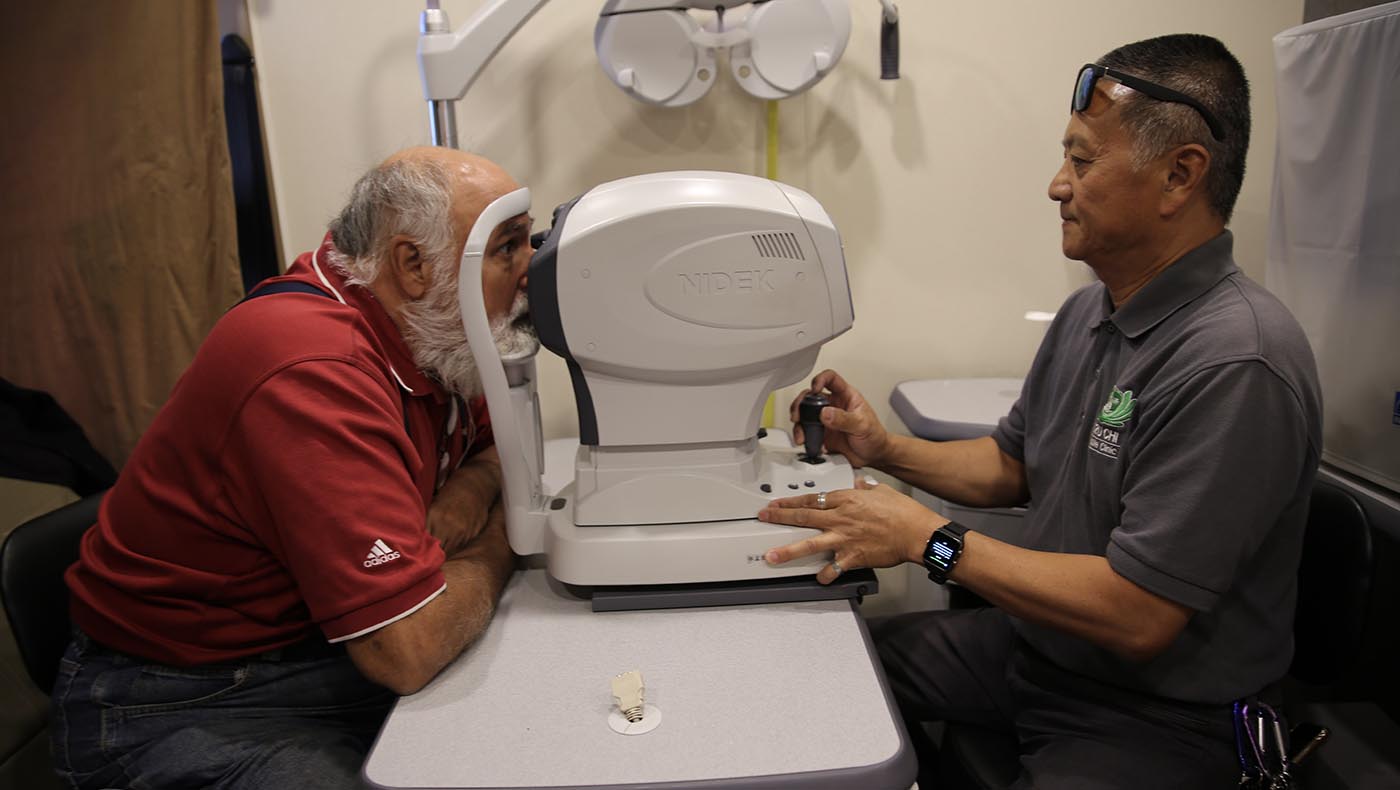
Due to the COVID-19 pandemic, Tzu Chi suspended free clinic activities for three years, but Ostrander spoke excitedly and conveyed that they were ready to go when this outreach resumed. “This year (2023), I’ve contacted the San Ysidro Health Center, a medical institution near the U.S.-Mexico border. They plan to carry out medical day activities and cooperate with Tzu Chi to provide medical services at the border. More services for vulnerable families at the border!”
San Gabriel Valley
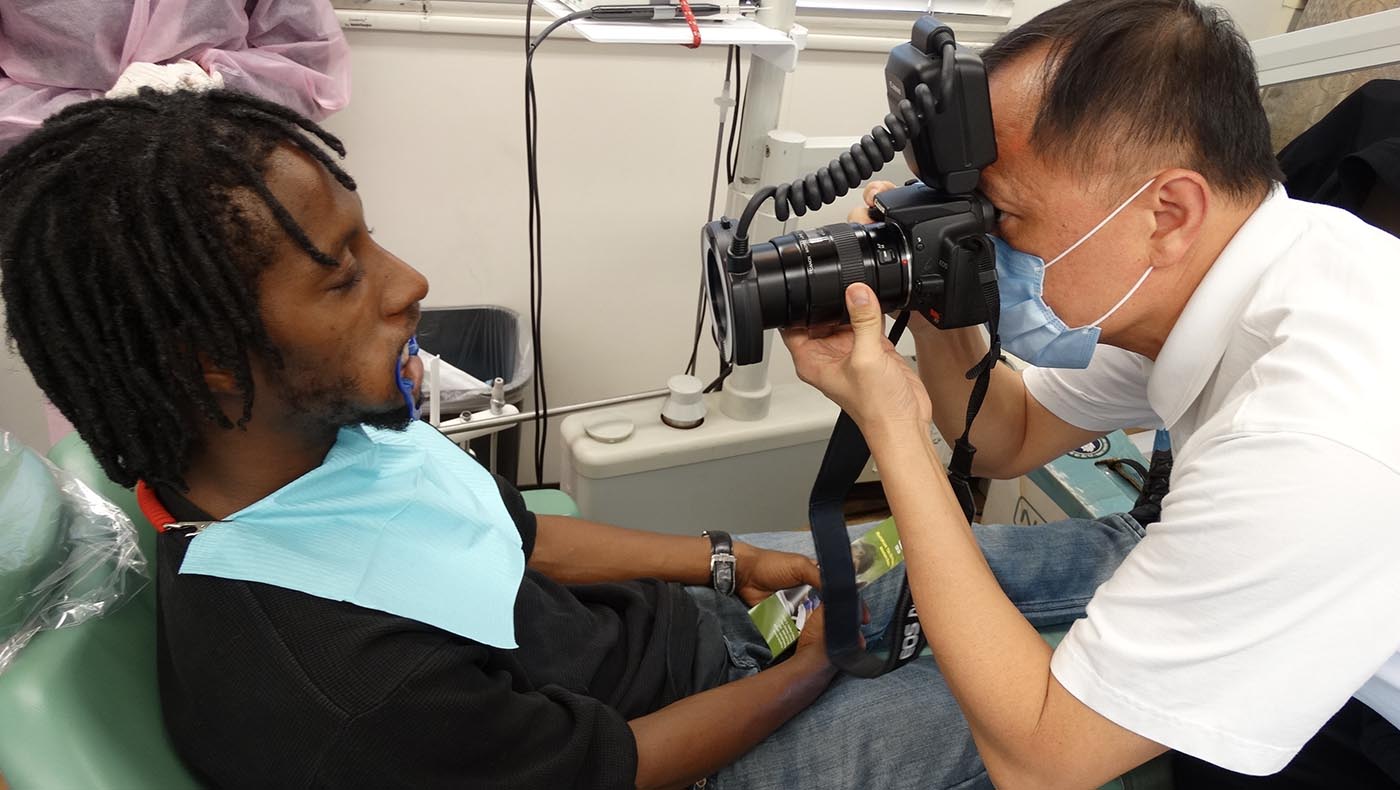
“No one cares about me. My relatives and friends don’t care, and the government doesn’t care. I’m left with a mouth full of rotten teeth falling out one by one…” Patricia Milligan shared her grievances. In 2016, the Tzu Chi medical team went to the Foothill Unity Center to hold the first free dental clinic to provide services to unhoused people, impoverished families, and those suffering from health issues.
An Alliance with Foothill Unity Center
TIMA dentist Richard Chang examined Patricia Milligan’s few “remaining teeth” and shook his head, “The braces and fillings are broken, and the repair and treatment will be a big project!” Since Milligan became homeless in 1996, she had been seeking treatment by every means for 20 years, but no one offered her help. It wasn’t until the Tzu Chi dental care team came to the Foothill Unity Center on April 22, 2016, that the nightmare ended.
Tzu Chi and Foothill Unity Center, Inc., two charitable organizations, allied after a meeting in 2014. Volunteer Shuqing Wang understood that there are many low-income immigrant families in the San Gabriel Valley, while Foothill Unity Center, Inc. was actively seeking medical resources to provide services to impoverished families needing health care. At the end of 2015, Dr. Boren Dang exclaimed emotionally during a sharing session with volunteers: “The Mobile Clinic only goes out a few times a year. It is such a waste of medical resources. It should be used more!” So Wang brought up this existing case, and William Keh, CEO of the Buddhist Tzu Chi Medical Foundation, and his wife Mary Keh, a dedicated Tzu Chi volunteer, spearheaded the initiative. The team visited Betty McWilliams, Executive Director at Foothill Unity Center, Inc. The two parties agreed to hold free vision and dental clinics monthly in 2016. The first free vision clinic occurred in February, and free dental clinics started in April.
Foothill Unity Center, Inc. was established in 1980 and provides services in 12 communities in the San Gabriel Valley. It helps neighbors in need with programs focusing on food, health, crisis case management, job development, volunteerism, and housing and homeless services. As a federally designated Community Action Agency and the region’s primary provider of integrated resources, it receives long-term government support and sponsorships from non-profit organizations. After strict review by the Foothill Unity Center, Tzu Chi provided a list of those needing medical services. The first free dental clinic mobilized three dentists, Richard Chang, Zhimin Zheng, and Shirley Chen, plus nurse Nianci Lin, two dental assistants, and eight volunteers to provide medical services such as screening, teeth scaling, fillings, and tooth extractions.
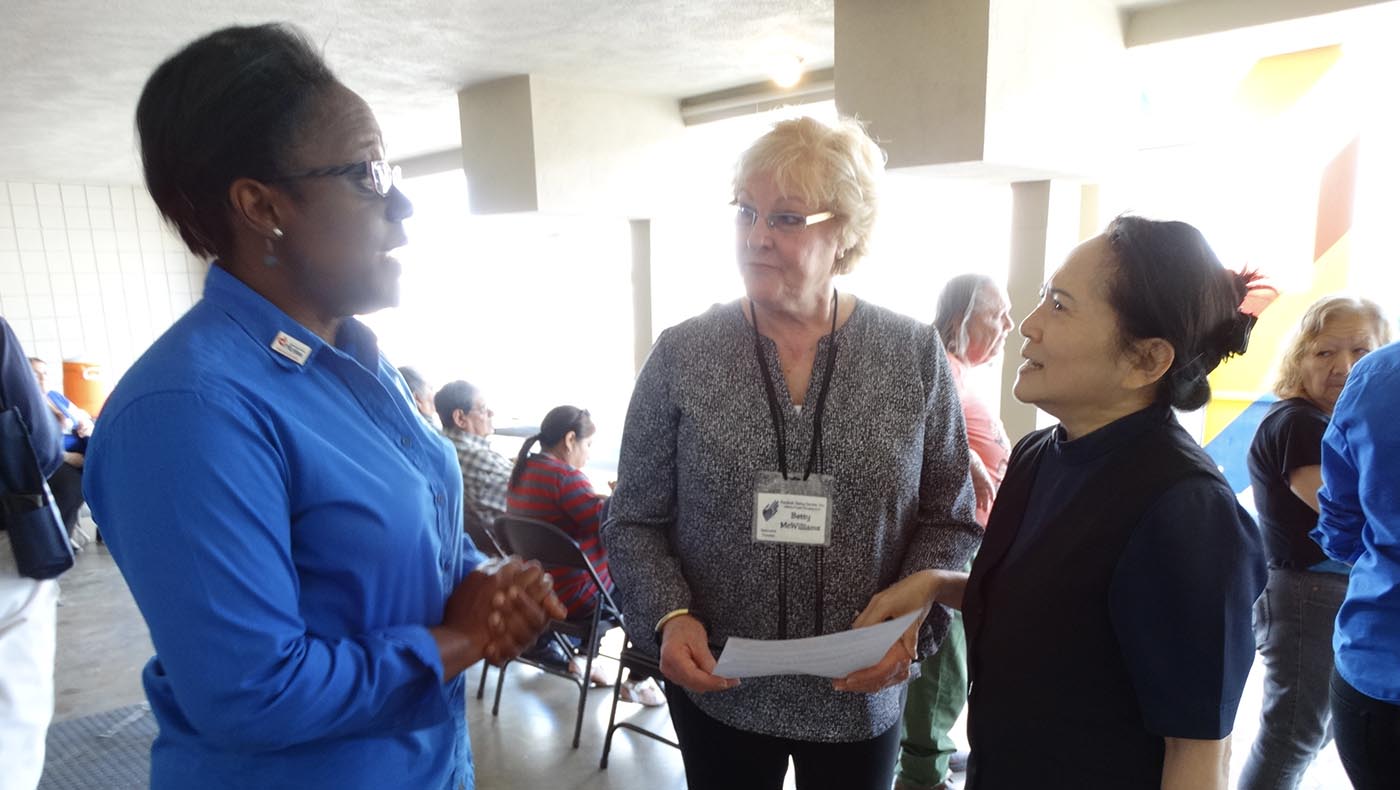
Collecting Food From Trash Cans
Patricia Milligan, who had only half her teeth left, enthusiastically said to the volunteers: “I have learned Chinese! My neighbor taught me Chinese in 1970.” Because of her affinity, she told the volunteers about her misery. Her parents both passed away in 1993, and after their house was sold, she had no place to go and, over the years, became homeless. She once stayed at a friend’s house, yet from 1996 to 2011, she was veritably living on the streets. The police often reprimanded her for no reason, and she was even mistaken for a criminal.
It wasn’t until September 2011 that Milligan applied for a low-rent apartment. However, there was very little left over from her limited social security funds after paying the rent. She could only go to the Foothill Unity Center to receive food. She had no money to see a doctor or have expensive dental treatment. “Fortunately, Tzu Chi has this free clinic. This free clinic is so important to the community!” Milligan said. “I have a friend who lost all his teeth after a fight. He was reduced to picking food from trash cans to eat. I want to introduce him to Tzu Chi for dental care. I hope you can heal him, too.”
Before leaving, Milligan said sadly: “I may have to go back to the streets.” It turned out that the rent had increased to the point where she could no longer afford it. Dr. Richard Chang reluctantly asked: “What will you do? Where are you going?” She shrugged and said sincerely: “Here is Tzu Chi, there is the Foothill Unity Center, and many good people are here to help us! I want to stay here!”
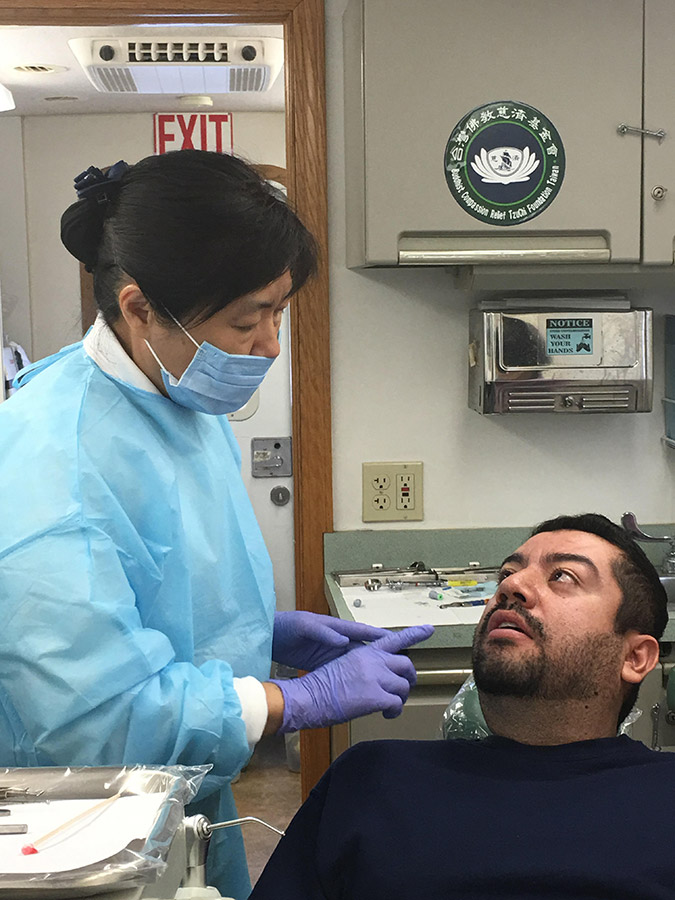
Brandon McCain was another person experiencing homelessness who came to the clinic that day. His last dental visit was four years ago, and he now had tooth decay. He was very grateful for Tzu Chi: “The doctors at Tzu Chi are skilled, fast, kind, and friendly, and they don’t hurt at all!” Brandon lived a nomadic life in the San Gabriel Valley, which he described as “place to place.” With no fixed abode, he visited many charities that provided beds. He queued up daily for a temporary bed and would wake up wondering where to sleep the next night. The cheap dental fillings he got many years ago were in tatters. He felt fortunate that Tzu Chi came to provide free dental care services.
McCain had terrible eating habits, often drinking soda as plain water. “My mother said that drinking milk can strengthen teeth. I thought drinking milk after drinking Coke would be enough!” he told a Foothill Unity Center physician. After Dr. Chang treated McCain, he offered oral hygiene instruction: “Healthy teeth actually have nothing to do with whether you drink milk or not, but how you maintain them. You must brush your teeth after meals. It’s better to consume less Coke and candies!”
Only the Most Conservative Damage
During free clinics, Dr. Richard Chang always smiled from beginning to end and treated every patient as his own family. In 2016, TIMA arranged 29 free clinics in the San Gabriel Valley, and Dr. Chang attended more than half of them. He always remained relaxed, helping his dental patients relax. Moreover, Chang would explain as he worked, for instance, that the shape of each cavity is different, and a different approach is needed to treat it.
Dentists from TIMA will try their best to do only the most conservative damage when treating a patient’s teeth.
Richard Chang
TIMA Dentist
As he held up a small bottle of medicine during one clinic, he explained to the patient, “This can treat large cavities, prevent damage caused by nerve pumping, and even regenerate nerves. Although this is a free clinic, we must care for every tooth.” TIMA dentists, including Chang, strive to do their best despite space and equipment limitations so that every patient will smile from the bottom of their heart after treatment.
One patient opened his mouth and complained of a hole in his tooth. Dr. Chang looked for a long time but couldn’t find it. He also asked a Spanish translator to assist. The patient insisted that “it felt like there was a hole.” The medical team was very patient and took X-rays. When the doctor received the X-ray results, he could prove there was no tooth decay at all. While the patient’s issues turned out to be psychological, he could return home with peace of mind.
For some reason, another patient, retired from the military, had all his teeth extracted a week before. He learned he would have to wait three months before he could get a complete set of dentures. He exclaimed, “Doctor! It’s so inconvenient. I want them all. I have to use a juicer to crush food before I can eat it. Can you help me install dentures now?” Dr. Chang replied: “Actually, your gums are currently swollen, but this will subside. The size of the teeth made now would not be suitable. You must wait, then return to the hospital or apply for insurance payment as a veteran.” The patient went home understanding his situation better, grateful for the doctor taking the time to explain and go beyond offering just dentistry services.
SHARE:
